
Blut und Schlacht (Blood and Battle): A Learner’s Saga
- Thread starter Bullfilter
- Start date
-
We have updated our Community Code of Conduct. Please read through the new rules for the forum that are an integral part of Paradox Interactive’s User Agreement.
You are using an out of date browser. It may not display this or other websites correctly.
You should upgrade or use an alternative browser.
You should upgrade or use an alternative browser.
Threadmarks
View all 262 threadmarks
Reader mode
Reader mode
Recent threadmarks
Chapter 159: The Valkyries’ Friend Three: Die Hard with a Vengeance (March 1021 to June 1024) Chapter 160: How do you solve a problem like Hafrid? (June 1024 to July 1026) Chapter 161: Faith, Gold and Ambition (August 1026 to June 1029) Chapter 162: War, Gold and Conquest (July 1029 – December 1031) Chapter 163: Helgi Rurikid and the Chamber of Secrets (December 1031 – October 1032) Chapter 164: Tyrs for Fears (October 1032 - September 1035) Chapter 165: A Lesson in Diplomacy (September 1035 – June 1039) Chapter 166: A Sliding Door (July 1039 – November 1041)It’s all to play for. Wonder what you’ll do about your son’s religion?
Last edited:
Not sure yet. Helgi is a great martial talent, but Craven (hence as Marshal he has not yet been martial), is a bastard and Slavic. If nothing realistic can be done to at least convert him from his heathen ways, then it’s either bowing to inevitability or seeing the new young son become the heir as he develops. Would have to work out how to do that. But the zealous Norseman Rurik would not be happy to let that drift, methinks. I think he needs to take some confidential counsel on this matter from the Godi and any other religious experts on that aspect, and from Hrorekr as Lawspeaker on the legal aspects (on options and strategies under Agnatic Elective Gavelkind succession provisions). Could end up being a messy succession (or even messier than normal).It’s all to okay for. Wonder what you’ll do about your son’s religion?
Unless of course (as has been intimated) I can await Helgi’s accession and, as the guiding player, voluntarily convert him to the True Norse Faith. All these things remain arcane mysteries to this neophyte player
If all else fails, there is the option of simply having Helgi's children tutored by someone with Norse/Germanic religion. Way of Life makes this more manageable since there are specific education foci for religion and heritage.
Suggest that’s too gamey. A zealot like Rurik would not let that stand. Kind of makes you wonder how the game has allowed such a thing to come to pass...CK2 eh?Unless of course (as has been intimated) I can await Helgi’s accession and, as the guiding player, voluntarily convert him to the True Norse Faith. All these things remain arcane mysteries to this neophyte player
Indeed. Banishment an option in this game? “Convert or get out of my sight, you craven heretic?”Suggest that’s too gamey. A zealot like Rurik would not let that stand. Kind of makes you wonder how the game has allowed such a thing to come to pass...CK2 eh?
You can certainly banish players. I suspect you can also imprison and execute heretics...just saying lolIndeed. Banishment an option in this game? “Convert or get out of my sight, you craven heretic?”
One of his warriors approaches Rurik: "My Jarl, I may not have served in your warband from the very beginning, but I heard the beginning of your story from my comrades. I only started following you a few months ago, but it was an honor and a pleasure to accompany you on your adventures. Let me tell you how I, my father's first born, came to join your army.
Like every tribal lord's my father's succession type was Elective Gavelkind. For religious reasons he nominated my younger brother, who hadn't even grown a beard at the time. Of course none of his vassals would vote for a baby instead of a well known veteran warrior.
But he stripped me of all my honorary titles and fired me from the council, so my renown stopped growing. A few years later my brother had grown up. Of course my father gave him all the titles, so all our vassals got to know him. And all of them got to see his lack of diplomatic skill. So they still promised to vote for me.
That's when my father decided to take away their titles. A few years later he and my uncle were the only electors left in the realm. My uncle voted for me, my father voted for his favourite son. And since the ruler's vote breaks a tie, my young brother got most of the land, when father died.
He promptly declared war on me and took away the few titles, that my father had to give me according to the laws of the gods. So I left my homeland and joined your warband, hoping to stand in the front line, when we one day conquer his land. I heard you had your own little succession crisis and I hope my tale can provide you with some insight."
TLDR: In elective Gavelkind the primary heir is elected. Votes are mostly decided by the candidates' prestige and diplomacy skill. (Your favourite candidates prestige can be boosted by giving him titles and offices. Diplomacy is mostly a result of his education and a bit of luck.) If there is a tie, the ruler breaks it, so your candidate automatically wins as long as there is no more than one other elector. In Gavelkind the secondary heirs still get some titles, but the primary heir will have claims on them.
Like every tribal lord's my father's succession type was Elective Gavelkind. For religious reasons he nominated my younger brother, who hadn't even grown a beard at the time. Of course none of his vassals would vote for a baby instead of a well known veteran warrior.
But he stripped me of all my honorary titles and fired me from the council, so my renown stopped growing. A few years later my brother had grown up. Of course my father gave him all the titles, so all our vassals got to know him. And all of them got to see his lack of diplomatic skill. So they still promised to vote for me.
That's when my father decided to take away their titles. A few years later he and my uncle were the only electors left in the realm. My uncle voted for me, my father voted for his favourite son. And since the ruler's vote breaks a tie, my young brother got most of the land, when father died.
He promptly declared war on me and took away the few titles, that my father had to give me according to the laws of the gods. So I left my homeland and joined your warband, hoping to stand in the front line, when we one day conquer his land. I heard you had your own little succession crisis and I hope my tale can provide you with some insight."
TLDR: In elective Gavelkind the primary heir is elected. Votes are mostly decided by the candidates' prestige and diplomacy skill. (Your favourite candidates prestige can be boosted by giving him titles and offices. Diplomacy is mostly a result of his education and a bit of luck.) If there is a tie, the ruler breaks it, so your candidate automatically wins as long as there is no more than one other elector. In Gavelkind the secondary heirs still get some titles, but the primary heir will have claims on them.
Welcome to the war band Spaßwolf: that was indeed a very instructive taleOne of his warriors approaches Rurik: "My Jarl, I may not have served in your warband from the very beginning, but I heard the beginning of your story from my comrades. I only started following you a few months ago, but it was an honor and a pleasure to accompany you on your adventures. Let me tell you how I, my father's first born, came to join your army.
Like every tribal lord's my father's succession type was Elective Gavelkind. For religious reasons he nominated my younger brother, who hadn't even grown a beard at the time. Of course none of his vassals would vote for a baby instead of a well known veteran warrior.
But he stripped me of all my honorary titles and fired me from the council, so my renown stopped growing. A few years later my brother had grown up. Of course my father gave him all the titles, so all our vassals got to know him. And all of them got to see his lack of diplomatic skill. So they still promised to vote for me.
That's when my father decided to take away their titles. A few years later he and my uncle were the only electors left in the realm. My uncle voted for me, my father voted for his favourite son. And since the ruler's vote breaks a tie, my young brother got most of the land, when father died.
He promptly declared war on me and took away the few titles, that my father had to give me according to the laws of the gods. So I left my homeland and joined your warband, hoping to stand in the front line, when we one day conquer his land. I heard you had your own little succession crisis and I hope my tale can provide you with some insight."
TLDR: In elective Gavelkind the primary heir is elected. Votes are mostly decided by the candidates' prestige and diplomacy skill. (Your favourite candidates prestige can be boosted by giving him titles and offices. Diplomacy is mostly a result of his education and a bit of luck.) If there is a tie, the ruler breaks it, so your candidate automatically wins as long as there is no more than one other elector. In Gavelkind the secondary heirs still get some titles, but the primary heir will have claims on them.
Chapter 13: Walls and Wolfhounds (10 March 871 – 1 June 872)
Chapter 13: Walls and Wolfhounds (10 March 871 – 1 June 872)
March 871
King Rurik has been away raiding since 24 July 869. This long expedition has made him very familiar with Cornwall (having sacked every settlement there) and now Devon (where he is well on the way to doing so). But there is still a good deal of work to be done, mead to be drunk, Saxon cities to be sacked and gold to be plundered. And the running of the realm goes on, whether through the occasional letter by fast ship or (mainly) through those members of the Council still back in Holmgarðr.
Rurik, following a letter from Hrörekr providing a summary of the advice from the last Thing, has decided that his long-term aim will be to do what he can to reform the Norse Faith. But that will take time and a power base he does not yet have in sufficient strength. So his intermediate aim is to do what he can to create a great Kingdom of Rus. In parallel to and fuelled by that grand project, he will also begin to unite at least three of the Norse Holy Sites under his supervision, keep the moral authority of the faith as high as he can, and continue to build his piety in hope of one day being able to invest it as a great reformer.
Of more immediate concern, as has been pointed out in private correspondence from Godi þorolfr to the King, supplementing the more public discourse on the Thing. The Godi has had it pointed out to him the Prince Helgi, Rurik’s son and heir, remains a Slavic Pagan by faith. This may be in line with the bulk of Holmgarðr’s subjects, but is anathema to the Norse Faith and, in particular, Rurik’s legacy. Unless something can be done, his heir as it stands now will spell the end of Rurik’s plans once he dies, if the succession falls to Helgi. Until now, Rurik has not pressed Helgi on this delicate matter, but it is now becoming something that can no longer be ignored.
Þorolfr writes that, in anticipation of the King’s question, Helgi cannot be forced to convert against his will. This can only be done by Rurik under a Reformed Norse Faith – which, ironically, may never occur if the dream were to die with him.
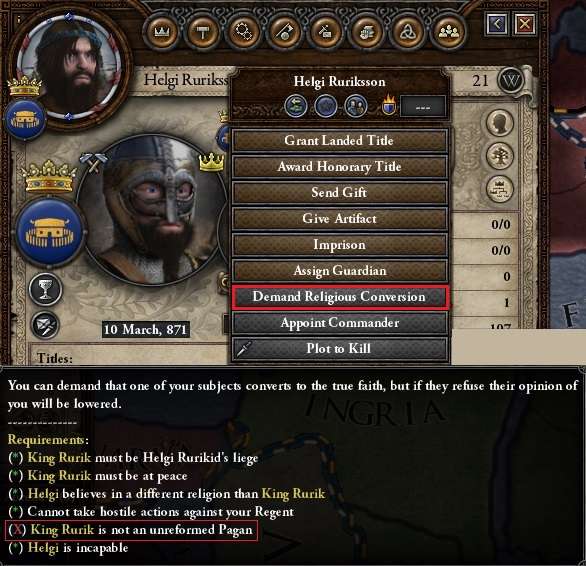
For now, this difficult question lies moot, especially as the more extreme options (murder or disinheritance) are as yet either too painful or untidy to implement. Though, if Rurik is honest with himself, not to at least contemplate.
Instead, Rurik contemplates a nicely illustrated map showing the constituent parts of the de jure Kingdom of Rus. While he is not yet ready to break the raid and return home for conquest, he can at least ready things as much as possible. The current building program is focusing on improvements that will increase the size of his levies and make multiple conquests easier in the near future. He also sends a letter back seeking some advice on how to go about prosecuting the long campaign to secure this Kingdom of Rus.
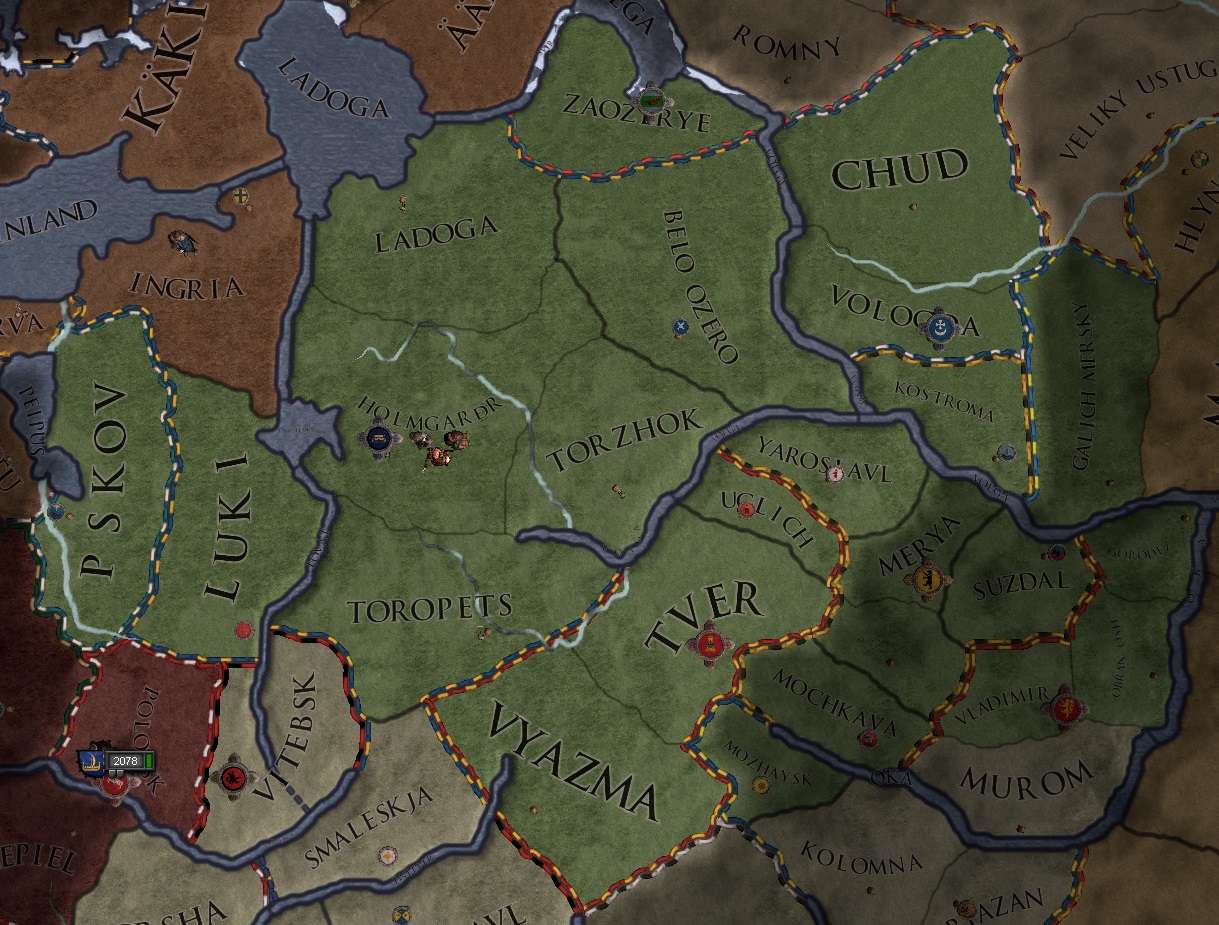
April 871
As Rurik paces his siege works around Exeter, he receives a message from a courier. Chancellor Hrörekr seems quite adept at wooing the King’s vassals when he puts his mind to it, or so his letter indicates. He will be left there to continue his good work for now. If it comes to a showdown with one or more Slovenskys, best to at least have him well happy.
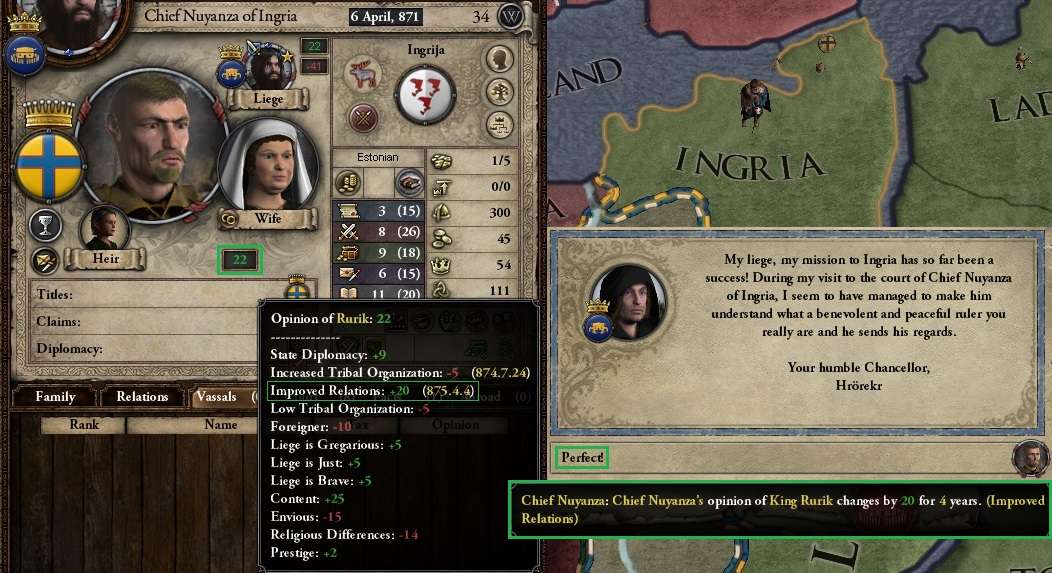
May 871
Dan’s wife gives birth to a good Norse son. May he grow into a strong warrior! Rurik can’t help but wonder why his own son Helgi, married over five years now, has not himself been able to sire any children. He will have to look into it on his return home: one of a growing list of disappointments he has with his son and heir.
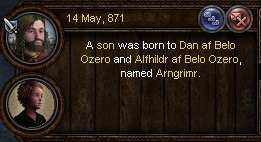
June 871
Rurik arrives back at the siege in mid-June, as he had planned, just in time to see the siege end and Exeter thoroughly sacked. Alas, not more prisoners are found for ransom, though a reasonable amount of loot is gathered. Next for the more lightly defended city of Axminster. The fleet is now approaching three quarters full.
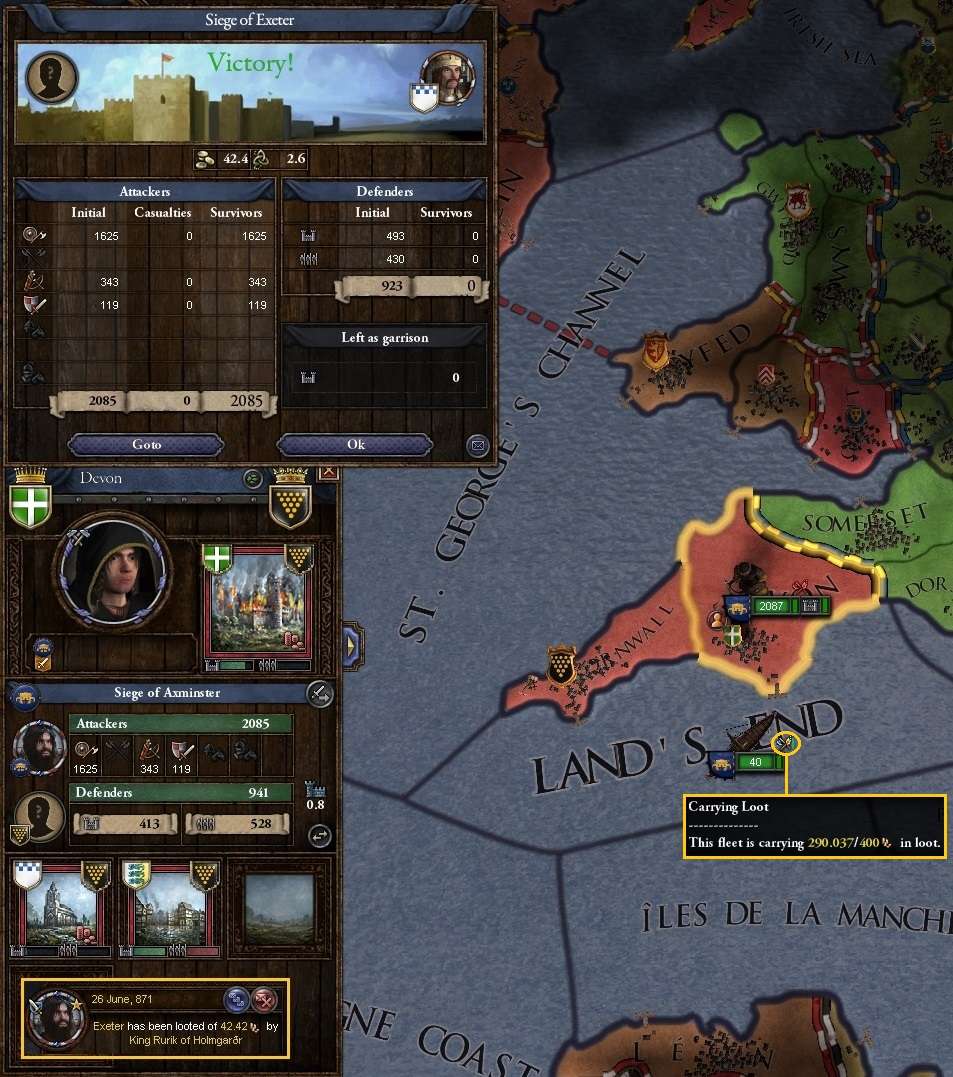
July 871
The long-term building program back home sees Ladoga’s defensive strength and levy capacity increased. More of the same is ordered.
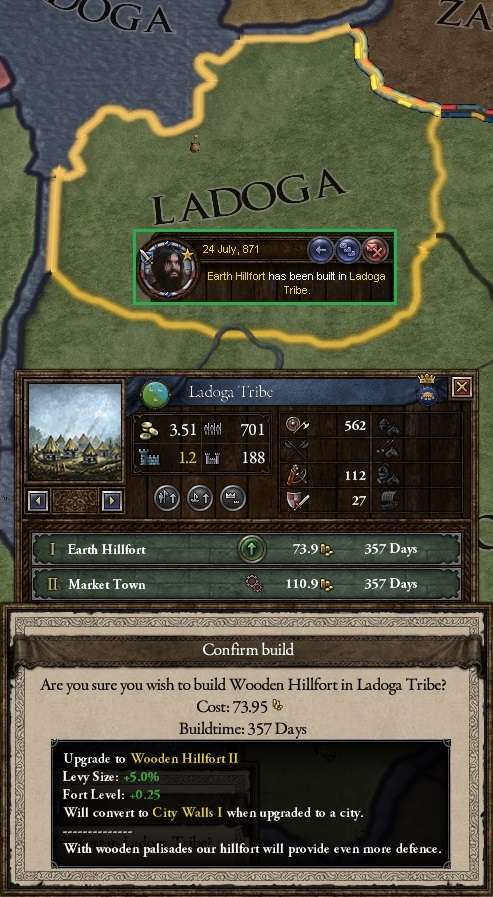
September 871
It is a slow and summery August at the siege works in Devon and ‘on the tools’ back home, where the capital’s tribal defences are further bolstered and more improvements ordered. Knowing there will be a large bonus of gold due when the great raid finishes, these projects are kept running at full tilt. Those requiring the prestige of the king to raise will be tackled once he has achieved his ambition of becoming an Exalted warrior among Norsemen.
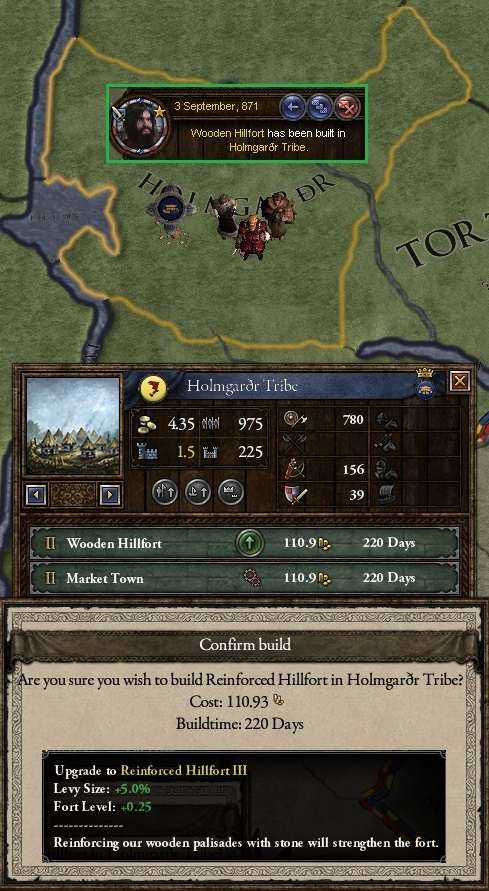
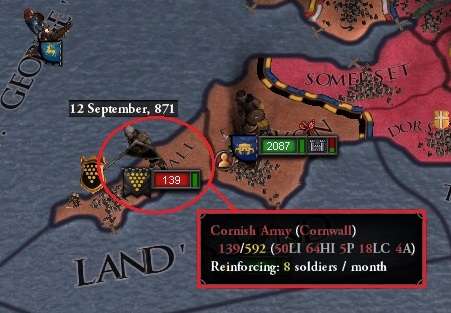
October 871
A month later, Axminster falls, delivering a great haul of gold, great ‘sport’ for the men, but alas no more prisoners. It will still be necessary to make that side-trip to Ireland on the way back home, in order to return with a full hold.
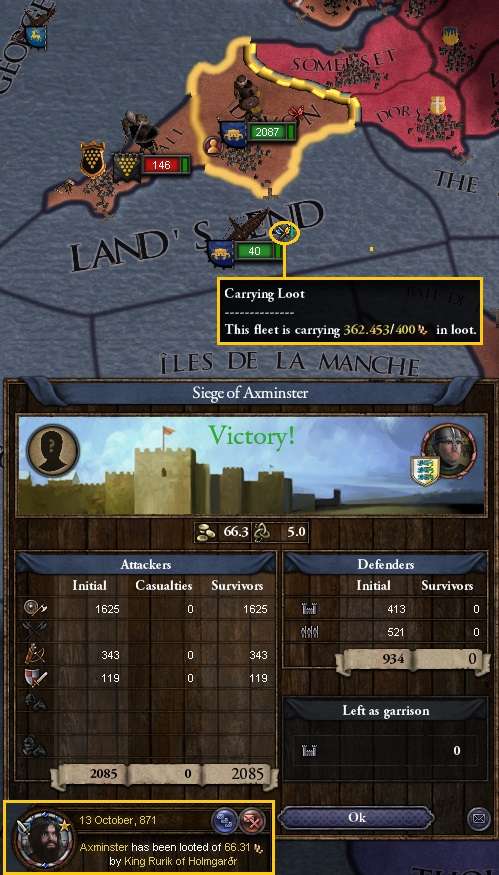
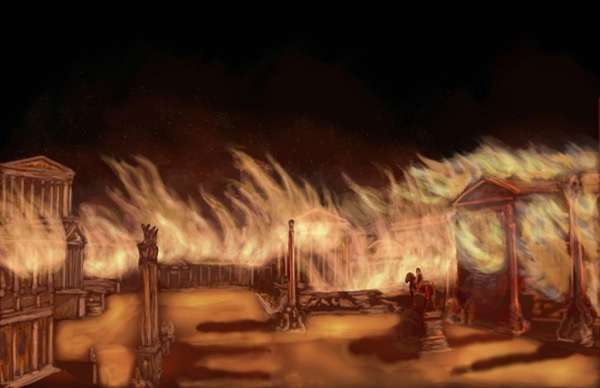
With their work done in Britannia for now, Rurik’s men bid Axminster and Devon a fond farewell. Viking style.
On 14 October the raiders board ship and sail away towards St George’s Channel, where they arrive eight days later off the south-eastern shore of Ireland.
November 871
While disembarking in Urmhumhain, Rurik receives a surprise. One of his retainers presents a puppy to the King: it has been sourced from fine local stock on orders from the Queen, as a gift.

The Irish wolfhound puppy presented to Rurik would have looked just like this. Except probably even cuter and more helplessly loyal-looking. Of course he would just throw it overboard!
But to do this would risk insulting the Queen. It looks at Rurik with soft, loyal puppy eyes. And gently licks his hand, lolling its little tongue out and panting gently - never breaking its adoring gaze into Rurik's eyes.
What possible reason would I have for not taking this excellent gift? Rurik must have thought to himself. For there seemed no reason to spurn it and every reason to keep it.
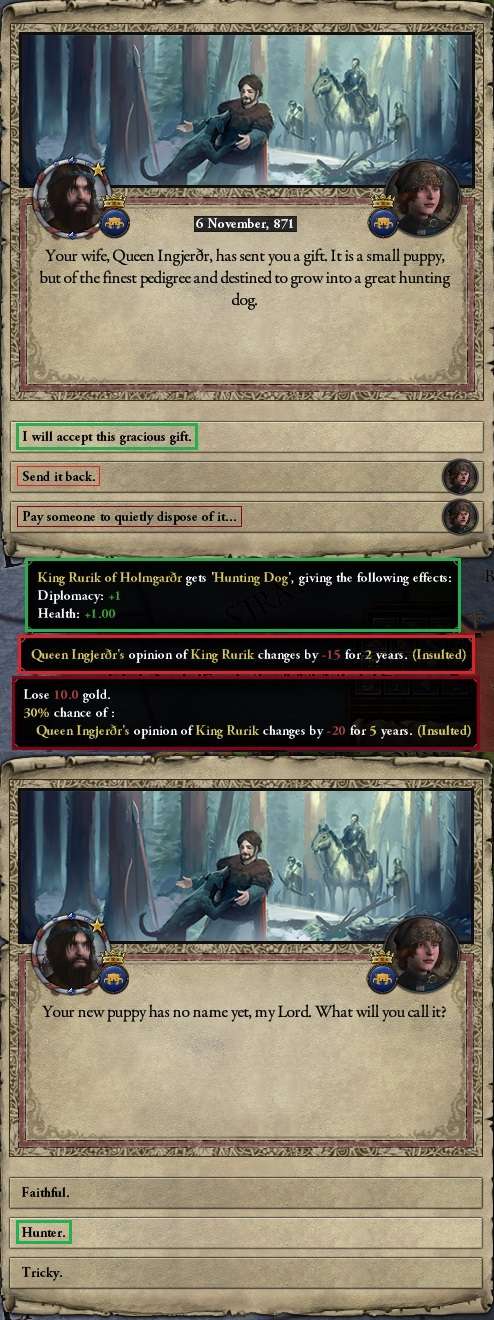
Of course, he gladly accepts the gracious gift. And in line with his recreational hunting focus, he names it … Hunter. Of course.
Two days later, the army has finished disembarking in Urmhumhain. The picking here are not very rich. They grab what they can from the countryside, but it is meagre. It looks like it will be more sieging before the coffers will be filled and they can return home. More boredom, as another winter away from home sets in. This will take months. Again.
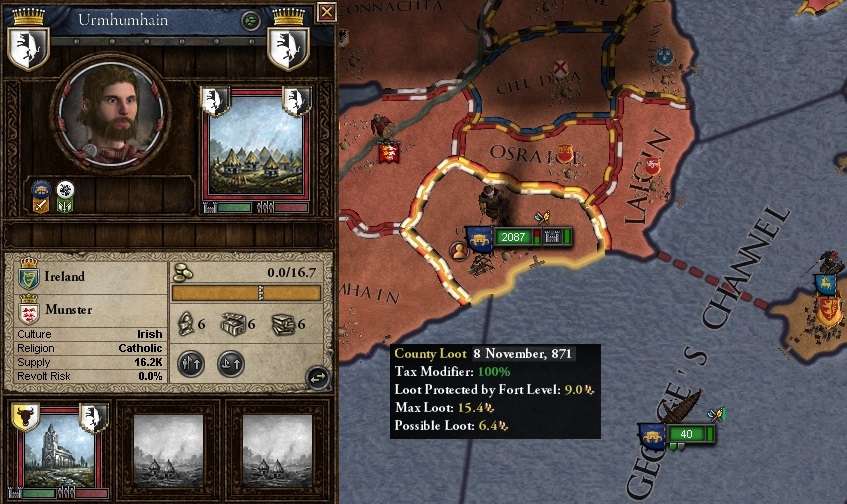
As he had previously arranged with his wife (confirmed in the note she sent with the instructions to procure the puppy), he sets sail on a fast galley for a rendezvous in Sardinia, which she will sail to from her research duties in Constantinople. Ostensibly, he will be there to reconnoitre possible future raiding targets around the rich Italian littoral. But he will also find time for a conjugal reunion with his wife (his children, now three and one, being back home at court at Nygarðr in the capital province of Holmgarðr). These local Irish wenches just aren’t the same as his young Norse wife! No-one will even notice he’s gone during this boring siege.
December 871
On 15 December, the port of Cagliari comes into view. Rurik arrives incognito, as a rich Norse traveller supposedly looking for trading opportunities. He meets his wife at villa she has arranged for their short stay. While there, he finds time to purchase some local maps and gather information on the wealth of several Italian provinces which may be targets for the kind of ‘one-way trade’ he and his men are interested in! Rich and either single county realms or isolated. But more research would need to be done into possible alliances and such like should a raid be sent there in due course.
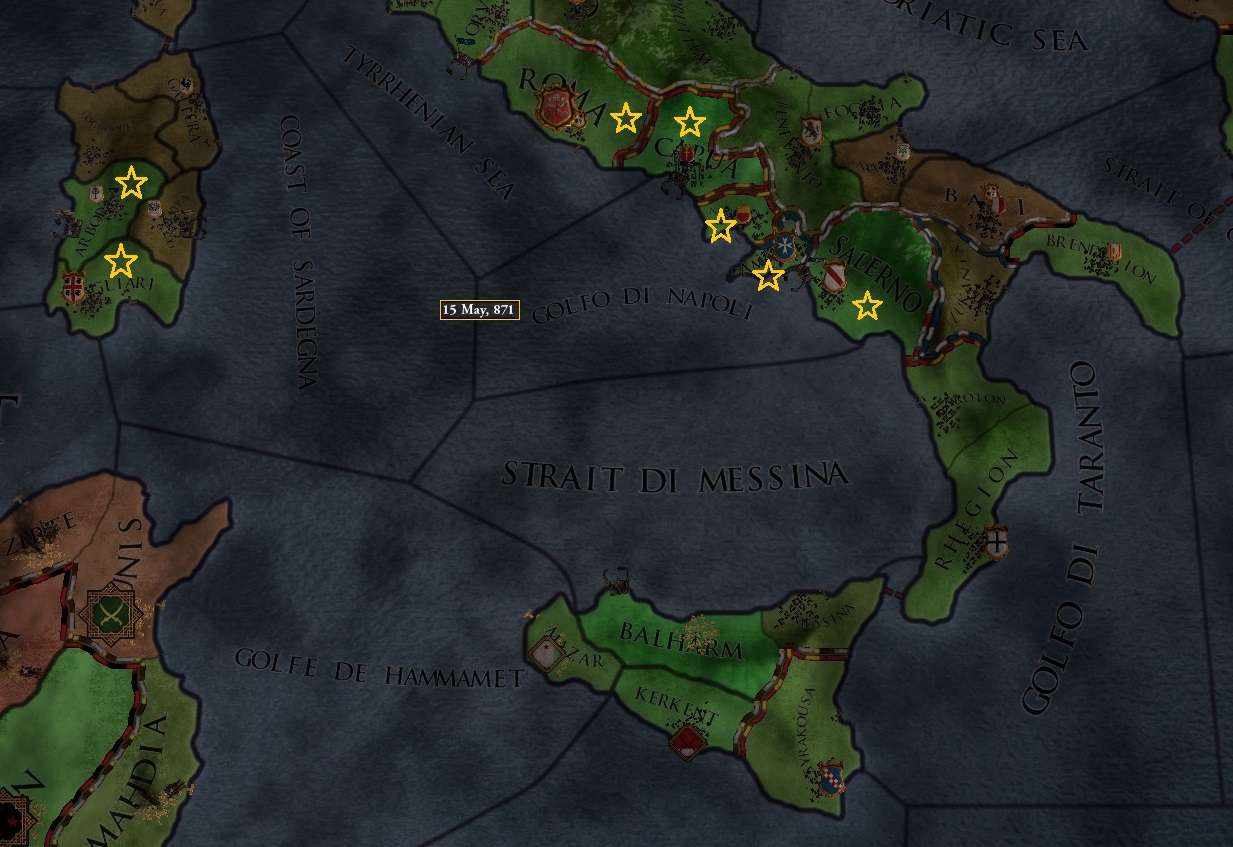
All too soon, Rurik must set sail back for far Ireland and Ingjerðr for the great imperial city of Constantinople.
Back in the realm, the provinces of Torzhok and Toropets now follow on in the fort building program. This will take the best part of a year each, so may as well get it started now.
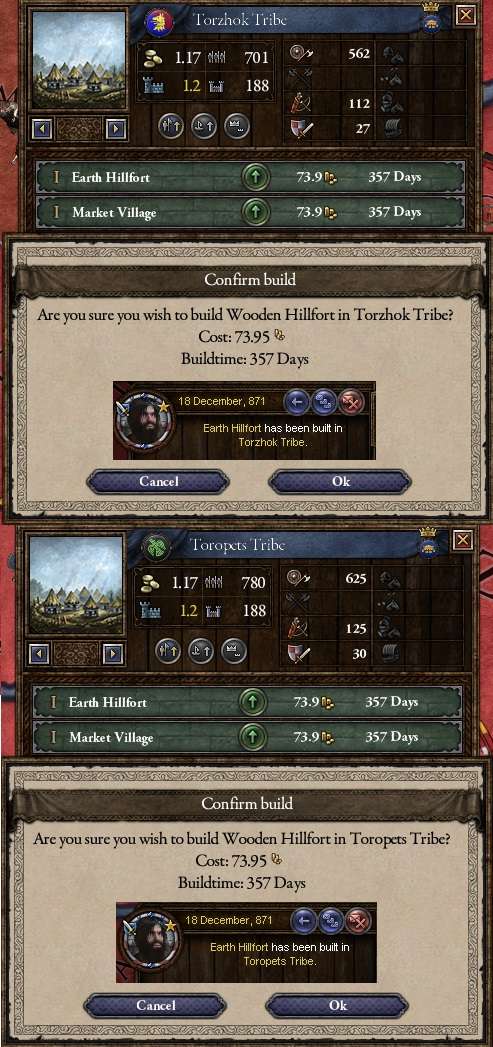
February 872
Back at the dreary siege work in Ireland, Rurik receives excellent news: his conjugal visit in Cagliari last summer has done the trick!
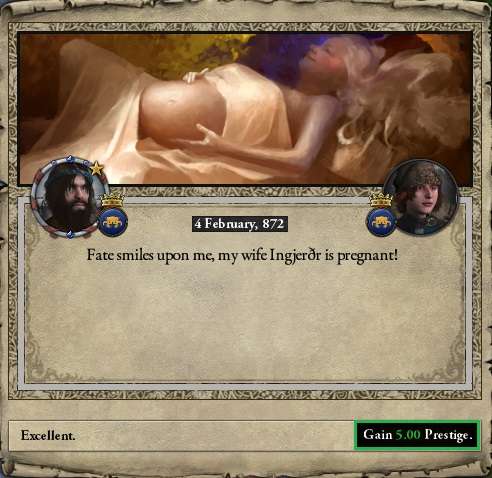
A week later, the siege ends. The pay out is even more pitiful than he imagined. They put the entire place to fire and sword. They move on to Dún Caiseal, which is reputed to be far wealthier than the tribal holding was. It had better be – what a goose chase this is!
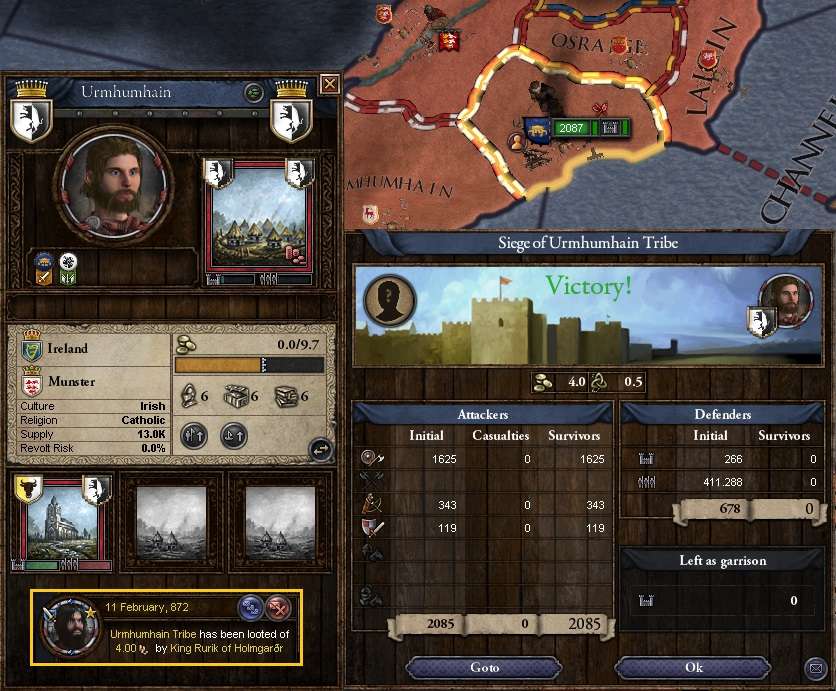
In Ingria, Gumarich accompanies Chancellor Hrörekr to a final audience with Chief Nuyanza, where he is finishing his goodwill mission.
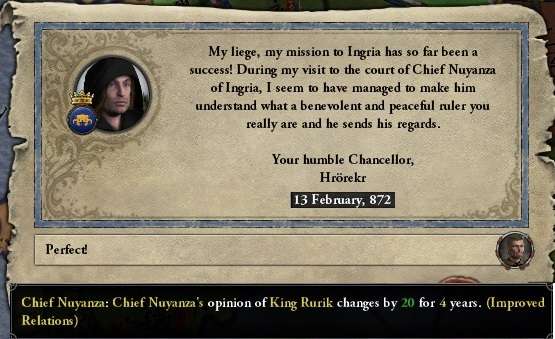
This latest round of persuasion has raised Nuyanza’s opinion of Rurik to over 40. He should be a good supporter for some time – especially should things turn darker at home and the King require the support of his loyal vassals for any internal matters.
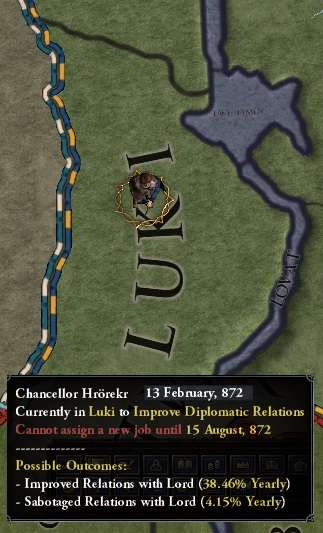
With that, Hrörekr set out to Luki, while Gumarich der Schreiber was back to the capital to continue his chronicle of the realm’s doings in the absence of his king – or 'Konungr’ in the new fashion – at raid in far flung parts.
April 872
In Ireland, Rurik’s wolfhound Hunter grows and soon adds to the esteem in which his men hold him.
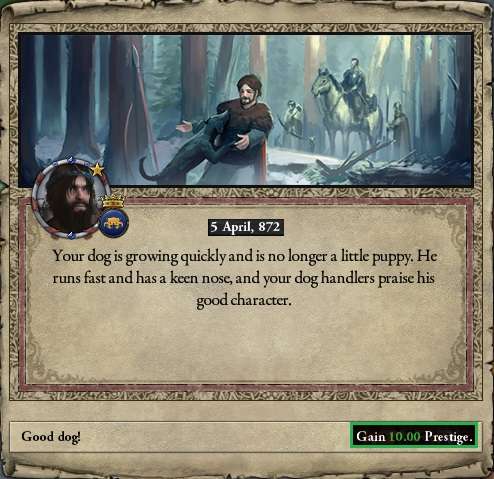
While back in Holmgarðr, the current fort building program reaches its conclusion for now. Funds are reduced to 26 gold with this new project. The anticipated homecoming of the raiding fleet, laden with Saxon and Irish treasure, will be used to replenish to coffers and re-establish a reserve of money for future emergencies.
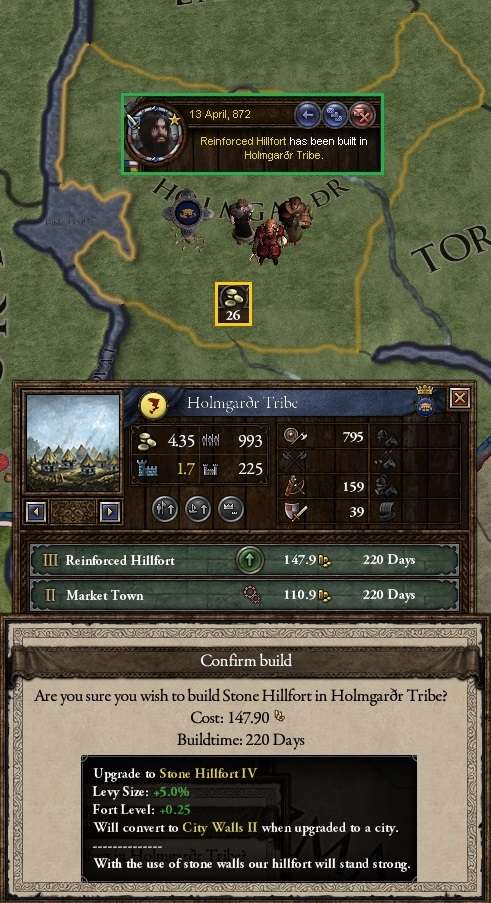
May 872
At last! The month's end sees Dún Caiseal’s walls breached and the place looted. The fleet is now full to the brim.
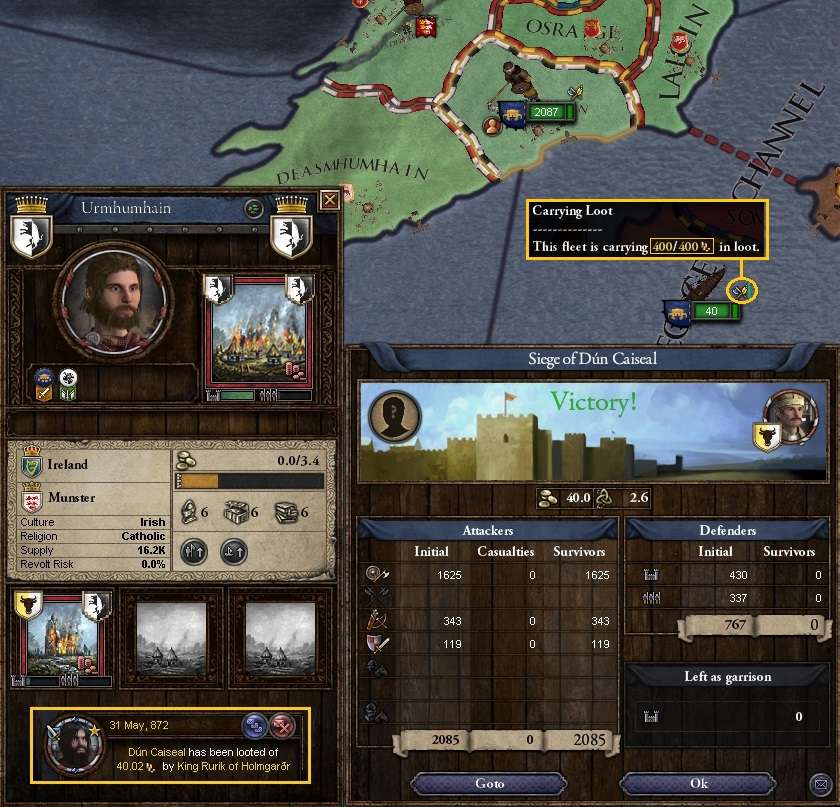
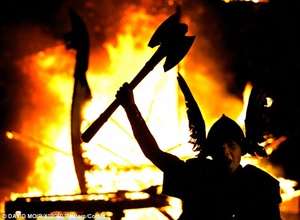
Yes! Back to the boats now, boys and girls! A shield maiden celebrates the successful end of a very long voyage.
June 872
After a short celebration, the raiders start loading up for the long voyage home. The translators of the Rurikid Chronicle are looking forward to seeing what transpires on ‘The Return of the King’! Rurik has grand plans, but will need to balance conquest with raiding; the advancement of the Faith at home and abroad against disbelievers (including his own son and powerful vassals) while dreaming of forming a great Kingdom of Rus.
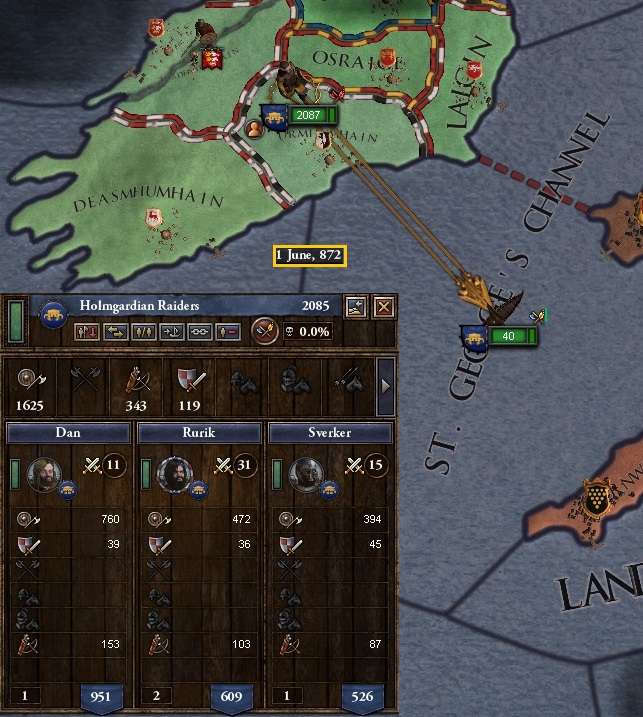
Ch13 Q1: De Jure Kingdom Formation. So, a quick read of the Wiki indicates more than 50% of a de jure Kingdom’s provinces must be controlled before it can be created. Does this remain true? So, I think I counted 24 provinces in de jure Rus, and I currently own six of them. Meaning I’d need to conquer another seven. Sound about right? Are there other conditions to fulfil as well (money, prestige, etc)?
Ch13 Q2: Raiding Post-Mortem. A more general question now. With that great raid finished, I feel it took a long time to fill the ships - or is that just my inexperience showing through and it was about as long as you would expect? Or perhaps Rurik's technique and tactics/choice of targets could have been better? Any views on this or any more general aspects welcome.
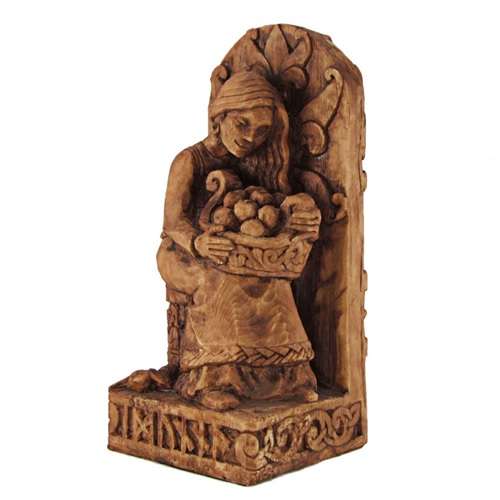
A votive offering is made to the Goddess Iðunn, with hopes of fertility for the coming harvest at home and in thanks for that of his wife and the impending birth of their third child. Rurik may also hope the ‘ever young’ and ‘rejuvenating one’ may also help him live a long life to fulfil his destiny and bring glory to the True Norse Gods.
March 871
King Rurik has been away raiding since 24 July 869. This long expedition has made him very familiar with Cornwall (having sacked every settlement there) and now Devon (where he is well on the way to doing so). But there is still a good deal of work to be done, mead to be drunk, Saxon cities to be sacked and gold to be plundered. And the running of the realm goes on, whether through the occasional letter by fast ship or (mainly) through those members of the Council still back in Holmgarðr.
Rurik, following a letter from Hrörekr providing a summary of the advice from the last Thing, has decided that his long-term aim will be to do what he can to reform the Norse Faith. But that will take time and a power base he does not yet have in sufficient strength. So his intermediate aim is to do what he can to create a great Kingdom of Rus. In parallel to and fuelled by that grand project, he will also begin to unite at least three of the Norse Holy Sites under his supervision, keep the moral authority of the faith as high as he can, and continue to build his piety in hope of one day being able to invest it as a great reformer.
Of more immediate concern, as has been pointed out in private correspondence from Godi þorolfr to the King, supplementing the more public discourse on the Thing. The Godi has had it pointed out to him the Prince Helgi, Rurik’s son and heir, remains a Slavic Pagan by faith. This may be in line with the bulk of Holmgarðr’s subjects, but is anathema to the Norse Faith and, in particular, Rurik’s legacy. Unless something can be done, his heir as it stands now will spell the end of Rurik’s plans once he dies, if the succession falls to Helgi. Until now, Rurik has not pressed Helgi on this delicate matter, but it is now becoming something that can no longer be ignored.
Þorolfr writes that, in anticipation of the King’s question, Helgi cannot be forced to convert against his will. This can only be done by Rurik under a Reformed Norse Faith – which, ironically, may never occur if the dream were to die with him.

For now, this difficult question lies moot, especially as the more extreme options (murder or disinheritance) are as yet either too painful or untidy to implement. Though, if Rurik is honest with himself, not to at least contemplate.
Instead, Rurik contemplates a nicely illustrated map showing the constituent parts of the de jure Kingdom of Rus. While he is not yet ready to break the raid and return home for conquest, he can at least ready things as much as possible. The current building program is focusing on improvements that will increase the size of his levies and make multiple conquests easier in the near future. He also sends a letter back seeking some advice on how to go about prosecuting the long campaign to secure this Kingdom of Rus.

Ch 13 Q 1: De Jure Kingdom Formation. So, a quick read of the Wiki indicates more than 50% of a de jure Kingdom’s provinces must be controlled before it can be created. Does this remain true? So, I think I counted 24 provinces in de jure Rus, and I currently own six of them. Meaning I’d need to conquer another seven. Sound about right? Are there other conditions to fulfil as well (money, prestige, etc)?
April 871
As Rurik paces his siege works around Exeter, he receives a message from a courier. Chancellor Hrörekr seems quite adept at wooing the King’s vassals when he puts his mind to it, or so his letter indicates. He will be left there to continue his good work for now. If it comes to a showdown with one or more Slovenskys, best to at least have him well happy.

May 871
Dan’s wife gives birth to a good Norse son. May he grow into a strong warrior! Rurik can’t help but wonder why his own son Helgi, married over five years now, has not himself been able to sire any children. He will have to look into it on his return home: one of a growing list of disappointments he has with his son and heir.

June 871
Rurik arrives back at the siege in mid-June, as he had planned, just in time to see the siege end and Exeter thoroughly sacked. Alas, not more prisoners are found for ransom, though a reasonable amount of loot is gathered. Next for the more lightly defended city of Axminster. The fleet is now approaching three quarters full.

July 871
The long-term building program back home sees Ladoga’s defensive strength and levy capacity increased. More of the same is ordered.

September 871
It is a slow and summery August at the siege works in Devon and ‘on the tools’ back home, where the capital’s tribal defences are further bolstered and more improvements ordered. Knowing there will be a large bonus of gold due when the great raid finishes, these projects are kept running at full tilt. Those requiring the prestige of the king to raise will be tackled once he has achieved his ambition of becoming an Exalted warrior among Norsemen.

“My King, a moment of your time!” Sverker approaches with a messenger newly arrived from Cornwall. They both have problems keeping straight faces.
“My apologies for interrupting, but we have news of King Dumnarth of Cornwall. He raises a ‘great’ host, perhaps to better us and lift the siege here. I know all our knees knock with fear.” He hands Rurik an annotated map.
“Ah, I see,” smiles Rurik, playing along. “In only four years and nine moons they will have reinforced to a strength where they will still not be worthy of our attentions! At least he tries. Perhaps I will send a few Norse younglings along to once again best this poor excuse for a King. Or maybe not!”
“My apologies for interrupting, but we have news of King Dumnarth of Cornwall. He raises a ‘great’ host, perhaps to better us and lift the siege here. I know all our knees knock with fear.” He hands Rurik an annotated map.
“Ah, I see,” smiles Rurik, playing along. “In only four years and nine moons they will have reinforced to a strength where they will still not be worthy of our attentions! At least he tries. Perhaps I will send a few Norse younglings along to once again best this poor excuse for a King. Or maybe not!”

October 871
A month later, Axminster falls, delivering a great haul of gold, great ‘sport’ for the men, but alas no more prisoners. It will still be necessary to make that side-trip to Ireland on the way back home, in order to return with a full hold.


With their work done in Britannia for now, Rurik’s men bid Axminster and Devon a fond farewell. Viking style.
On 14 October the raiders board ship and sail away towards St George’s Channel, where they arrive eight days later off the south-eastern shore of Ireland.
November 871
While disembarking in Urmhumhain, Rurik receives a surprise. One of his retainers presents a puppy to the King: it has been sourced from fine local stock on orders from the Queen, as a gift.
“My King, what are we to do with the animal?” says his retainer. “Perhaps it may be - ah - too much trouble to keep on campaign.” With one eyebrow raised in question, he looks towards a spare sack and a couple of rocks sitting near the prow of the ship.

The Irish wolfhound puppy presented to Rurik would have looked just like this. Except probably even cuter and more helplessly loyal-looking. Of course he would just throw it overboard!
But to do this would risk insulting the Queen. It looks at Rurik with soft, loyal puppy eyes. And gently licks his hand, lolling its little tongue out and panting gently - never breaking its adoring gaze into Rurik's eyes.
What possible reason would I have for not taking this excellent gift? Rurik must have thought to himself. For there seemed no reason to spurn it and every reason to keep it.

Of course, he gladly accepts the gracious gift. And in line with his recreational hunting focus, he names it … Hunter. Of course.
Two days later, the army has finished disembarking in Urmhumhain. The picking here are not very rich. They grab what they can from the countryside, but it is meagre. It looks like it will be more sieging before the coffers will be filled and they can return home. More boredom, as another winter away from home sets in. This will take months. Again.

As he had previously arranged with his wife (confirmed in the note she sent with the instructions to procure the puppy), he sets sail on a fast galley for a rendezvous in Sardinia, which she will sail to from her research duties in Constantinople. Ostensibly, he will be there to reconnoitre possible future raiding targets around the rich Italian littoral. But he will also find time for a conjugal reunion with his wife (his children, now three and one, being back home at court at Nygarðr in the capital province of Holmgarðr). These local Irish wenches just aren’t the same as his young Norse wife! No-one will even notice he’s gone during this boring siege.
December 871
On 15 December, the port of Cagliari comes into view. Rurik arrives incognito, as a rich Norse traveller supposedly looking for trading opportunities. He meets his wife at villa she has arranged for their short stay. While there, he finds time to purchase some local maps and gather information on the wealth of several Italian provinces which may be targets for the kind of ‘one-way trade’ he and his men are interested in! Rich and either single county realms or isolated. But more research would need to be done into possible alliances and such like should a raid be sent there in due course.

All too soon, Rurik must set sail back for far Ireland and Ingjerðr for the great imperial city of Constantinople.
Back in the realm, the provinces of Torzhok and Toropets now follow on in the fort building program. This will take the best part of a year each, so may as well get it started now.

February 872
Back at the dreary siege work in Ireland, Rurik receives excellent news: his conjugal visit in Cagliari last summer has done the trick!

A week later, the siege ends. The pay out is even more pitiful than he imagined. They put the entire place to fire and sword. They move on to Dún Caiseal, which is reputed to be far wealthier than the tribal holding was. It had better be – what a goose chase this is!

In Ingria, Gumarich accompanies Chancellor Hrörekr to a final audience with Chief Nuyanza, where he is finishing his goodwill mission.

This latest round of persuasion has raised Nuyanza’s opinion of Rurik to over 40. He should be a good supporter for some time – especially should things turn darker at home and the King require the support of his loyal vassals for any internal matters.
“Formaðr [Chief] Nuyanza, it has been a great pleasure to pass these months with you by the sea in Ingria,” Hrörekr opined. “But now, I must take my leave as I must do the business of our Konungr [King] Rurik.”
“Hrörekr; Chancellor, Lawspeaker and - if I may – friend. It has been my privilege and pleasure to have you as my guest. I must say our long discussions and time spent talking about the future of the realm and our Konungr’s vision for it have persuaded me of his good offices and good character.”
“And he will thank you for your support, as I thank you for using the Norse term for his high office that he now wishes the king of this realm to be known by. We have discussed both the similarities and differences between the Germanic and Finnish people’s and am glad that we may find harmony between us at this pass in our story.”
“I hope he will and to see him return to our lands soon. From our talks, I expect much action at home when he does, if the glory of a greater kingdom is to be ours. Where do you fare next on our good Konungr’s business? Back home to the court in Nygarðr?”
“Nay Formaðr, I am south to the lands of our good Chief Svetozar Slovensky. It is to Luki I now travel, to ply my gentle arts of persuasion on our proud lord.”
“Hrörekr; Chancellor, Lawspeaker and - if I may – friend. It has been my privilege and pleasure to have you as my guest. I must say our long discussions and time spent talking about the future of the realm and our Konungr’s vision for it have persuaded me of his good offices and good character.”
“And he will thank you for your support, as I thank you for using the Norse term for his high office that he now wishes the king of this realm to be known by. We have discussed both the similarities and differences between the Germanic and Finnish people’s and am glad that we may find harmony between us at this pass in our story.”
“I hope he will and to see him return to our lands soon. From our talks, I expect much action at home when he does, if the glory of a greater kingdom is to be ours. Where do you fare next on our good Konungr’s business? Back home to the court in Nygarðr?”
“Nay Formaðr, I am south to the lands of our good Chief Svetozar Slovensky. It is to Luki I now travel, to ply my gentle arts of persuasion on our proud lord.”

“Well my friend, I wish you luck with that! If anyone can talk him around, it would be you. But be not surprised if the result is opposite to that which you desire!”
“Indeed my good Chief Nuyanza – we will see what progress I may make before our leader returns. Should my efforts with Svetozar not go well, I fear the king will have cause for grave dissatisfaction of his own. I hope it does not come to that pass, but would once again rely on your support should my importuning be unsuccessful.”
“Indeed my good Chief Nuyanza – we will see what progress I may make before our leader returns. Should my efforts with Svetozar not go well, I fear the king will have cause for grave dissatisfaction of his own. I hope it does not come to that pass, but would once again rely on your support should my importuning be unsuccessful.”
With that, Hrörekr set out to Luki, while Gumarich der Schreiber was back to the capital to continue his chronicle of the realm’s doings in the absence of his king – or 'Konungr’ in the new fashion – at raid in far flung parts.
April 872
In Ireland, Rurik’s wolfhound Hunter grows and soon adds to the esteem in which his men hold him.

While back in Holmgarðr, the current fort building program reaches its conclusion for now. Funds are reduced to 26 gold with this new project. The anticipated homecoming of the raiding fleet, laden with Saxon and Irish treasure, will be used to replenish to coffers and re-establish a reserve of money for future emergencies.

May 872
At last! The month's end sees Dún Caiseal’s walls breached and the place looted. The fleet is now full to the brim.


Yes! Back to the boats now, boys and girls! A shield maiden celebrates the successful end of a very long voyage.
June 872
After a short celebration, the raiders start loading up for the long voyage home. The translators of the Rurikid Chronicle are looking forward to seeing what transpires on ‘The Return of the King’! Rurik has grand plans, but will need to balance conquest with raiding; the advancement of the Faith at home and abroad against disbelievers (including his own son and powerful vassals) while dreaming of forming a great Kingdom of Rus.

---xxx---
Ch13 Q1: De Jure Kingdom Formation. So, a quick read of the Wiki indicates more than 50% of a de jure Kingdom’s provinces must be controlled before it can be created. Does this remain true? So, I think I counted 24 provinces in de jure Rus, and I currently own six of them. Meaning I’d need to conquer another seven. Sound about right? Are there other conditions to fulfil as well (money, prestige, etc)?
Ch13 Q2: Raiding Post-Mortem. A more general question now. With that great raid finished, I feel it took a long time to fill the ships - or is that just my inexperience showing through and it was about as long as you would expect? Or perhaps Rurik's technique and tactics/choice of targets could have been better? Any views on this or any more general aspects welcome.
---xxx---

A votive offering is made to the Goddess Iðunn, with hopes of fertility for the coming harvest at home and in thanks for that of his wife and the impending birth of their third child. Rurik may also hope the ‘ever young’ and ‘rejuvenating one’ may also help him live a long life to fulfil his destiny and bring glory to the True Norse Gods.
Last edited:
Sorry, I was unable to delete the dog pic.Ch13 Q1: De Jure Kingdom Formation. So, a quick read of the Wiki indicates more than 50% of a de jure Kingdom’s provinces must be controlled before it can be created. Does this remain true? So, I think I counted 24 provinces in de jure Rus, and I currently own six of them. Meaning I’d need to conquer another seven. Sound about right? Are there other conditions to fulfil as well (money, prestige, etc)?
Ch13 Q2: Raiding Post-Mortem. A more general question now. With that great raid finished, I feel it took a long time to fill the ships - or is that just my inexperience showing through and it was about as long as you would expect? Or perhaps Rurik's technique and tactics/choice of targets could have been better? Any views on this or any more general aspects welcome.
Q1: If you can get to the Kingdom of Rus menu, the 'Create' button should reveal the information, when you mouse over it. To get to the menu, click the banner of one of the lower titles (e.g. your duchy), check the 'de jure' box and click the banner of the Kingdom of Rus. IIRC you lose money and gain prestige, when you create a kingdom.
Q2: When raiding I try to avoid castles as much as possible. Sieging cities and churches is easier for more or less equal rewards. Sieging tribes is quick for low rewards. Ireland's churches are only protected by tribes, so that's easy raiding.
Theocracies or Merchant Republics are good targets as well. (There is a 'government type' map mode. Feudal is bad for raiding.)
Spaßwolf already covered kingdom creation. Just one other thing to keep in mind is that creating an existing de jure kingdom requires 200 piety. Something else to consider is that the more piety you accrue, the more the cost of kingdom creation reduces. Not something you need to worry about, but it may be worth considering later or in another campaign.
If you get a sufficiently large raiding force, you can assault a holding during a siege. Having ten times the attackers as the defenders tends to be a good rule of thumb, though force composition matters (don't try and do it with all cavalry!).
There are more conditions, money I think, but you should be fine once you have all the provinces you need.Ch13 Q1: De Jure Kingdom Formation. So, a quick read of the Wiki indicates more than 50% of a de jure Kingdom’s provinces must be controlled before it can be created. Does this remain true? So, I think I counted 24 provinces in de jure Rus, and I currently own six of them. Meaning I’d need to conquer another seven. Sound about right? Are there other conditions to fulfil as well (money, prestige, etc)?
I would say it is fine. There is nothing special that you can do to make it fill faster, except by using the "disembark and just grab the loot, rinse and repeat" tecnique, but I would argue you were better of without it (basically it would just be disembark the army, let them pillage the amount of land they can in the short term, and then move to another county). But again, I think you are doing fine.Ch13 Q2: Raiding Post-Mortem. A more general question now. With that great raid finished, I feel it took a long time to fill the ships - or is that just my inexperience showing through and it was about as long as you would expect? Or perhaps Rurik's technique and tactics/choice of targets could have been better? Any views on this or any more general aspects welcome.
Also nice name for the dog, but I find it funny because that is actually my cat's name!
(He sucks at hunting though, when he sees a prey he begins to meow and any animal with ears immediately realizes he is there and runs).
As for the Kingdom ofRus, just hover over the Create button. You need 51% of provinces, some gold, and some piety. Probably at least 2 duchy titles too.
Raiding is slow but lucrative. Ireland, Republics, and Theocracies. Just be careful on the latter 2; the Pope in particular will raise mercenaries in his other counties and then curbstomp your raiders.
Raiding is slow but lucrative. Ireland, Republics, and Theocracies. Just be careful on the latter 2; the Pope in particular will raise mercenaries in his other counties and then curbstomp your raiders.
Exactly what I was going to advise! Makes things much quicker. Also going at churches and cities. What about the lands of Wessex and Kent, Essex and East Anglia? There will be richer pickings than Ireland there.If you get a sufficiently large raiding force, you can assault a holding during a siege. Having ten times the attackers as the defenders tends to be a good rule of thumb, though force composition matters (don't try and do it with all cavalry!).
Noted re assaults - though I never seemed to have more than about 3:1 odds and thought I might soon run out of troops. Earlier pass at East Anglia had large armies nearby. Wessex I thought might have mustered a fair-sized armies, while some other of the coastal provinces seemed to have been raided down so I thought the pickings may have been poorer. I only did Ireland at the end to top up the fleet (at the suggestion of many), but did find it a bit slow.Exactly what I was going to advise! Makes things much quicker. Also going at churches and cities. What about the lands of Wessex and Kent, Essex and East Anglia? There will be richer pickings than Ireland there.
I wouldn’t mind doing a river raid next, just to experiment. A Paris raid would be neat (a la history) but may be somewhat dangerous.
Rurik Takes Counsel (Summary of advice for Chapter 13 - June 872)
Rurik Takes Counsel (Summary of advice for Chapter 13 - June 872)
As he prepares to sail home, Rurik ponders the advice he has received and starts to plan for his return to Holmgarđr. He has some strategic decisions to make.
General
 Our cat is 'Augustus': sometimes regal, but never an Emperor - especially when 'cleaning' things as cats do! He did catch a small lizard yesterday - inside the house - but was 'persuaded' to release it (unharmed I might add) after bringing it to us as a trophy. Better than his squeaking/chattering at birds! Given Rurik's focus and the names offered, there was only one choice for the dog in this game
Our cat is 'Augustus': sometimes regal, but never an Emperor - especially when 'cleaning' things as cats do! He did catch a small lizard yesterday - inside the house - but was 'persuaded' to release it (unharmed I might add) after bringing it to us as a trophy. Better than his squeaking/chattering at birds! Given Rurik's focus and the names offered, there was only one choice for the dog in this game  .
.
Ch13 Q1: De Jure Kingdom Formation. So, a quick read of the Wiki indicates more than 50% of a de jure Kingdom’s provinces must be controlled before it can be created. Does this remain true? So, I think I counted 24 provinces in de jure Rus, and I currently own six of them. Meaning I’d need to conquer another seven. Sound about right? Are there other conditions to fulfil as well (money, prestige, etc)?


This all gives something specific for Rurik to work on.
Ch13 Q2: Raiding Post-Mortem. A more general question now. With that great raid finished, I feel it took a long time to fill the ships - or is that just my inexperience showing through and it was about as long as you would expect? Or perhaps Rurik's technique and tactics/choice of targets could have been better? Any views on this or any more general aspects welcome.

New Supplementary Question: So, if you see mercs being raised or a larger army than you want to face comes calling, can you just re-embark your force on the ships and run away, or are you made to fight out the battle once commenced? Come to think of that, same question really, in an ordinary field battle, can you pull out at any time you start to dislike the odds by click-moving your army outta there (for example, like you can in HOI3)? Or must you await your doom until the battle finishes?
Again, thanks for the advice and continued support everyone! Rurik must now complete his return voyage and decide what he is to do with his internal arrangements and his aspirations for a Kingdom of Rus - and eventual reform of the Norse One True Faith!
As he prepares to sail home, Rurik ponders the advice he has received and starts to plan for his return to Holmgarđr. He has some strategic decisions to make.
---xxx---
General
Nice.Also nice name for the dog, but I find it funny because that is actually my cat's name!
(He sucks at hunting though, when he sees a prey he begins to meow and any animal with ears immediately realizes he is there and runs).
---xxx---
Ch13 Q1: De Jure Kingdom Formation. So, a quick read of the Wiki indicates more than 50% of a de jure Kingdom’s provinces must be controlled before it can be created. Does this remain true? So, I think I counted 24 provinces in de jure Rus, and I currently own six of them. Meaning I’d need to conquer another seven. Sound about right? Are there other conditions to fulfil as well (money, prestige, etc)?
Rurik will do that very thing when he gets home (indeed, Chancellor Hrorekr has anticipated the need and has had a look already.Q1: If you can get to the Kingdom of Rus menu, the 'Create' button should reveal the information, when you mouse over it. To get to the menu, click the banner of one of the lower titles (e.g. your duchy), check the 'de jure' box and click the banner of the Kingdom of Rus. IIRC you lose money and gain prestige, when you create a kingdom.
Yes, confirmed that Piety cost when looking into it just now.Spaßwolf already covered kingdom creation. Just one other thing to keep in mind is that creating an existing de jure kingdom requires 200 piety. Something else to consider is that the more piety you accrue, the more the cost of kingdom creation reduces. Not something you need to worry about, but it may be worth considering later or in another campaign.
Current cost is about 346 gold. My estimate of the province numbers was correct. I'll need 13 in total.There are more conditions, money I think, but you should be fine once you have all the provinces you need.
Yes, all of the above. Details will be provided via one of Gumarich's scrolls in the next update.As for the Kingdom of Rus, just hover over the Create button. You need 51% of provinces, some gold, and some piety. Probably at least 2 duchy titles too.
This all gives something specific for Rurik to work on.
---xxx---
Ch13 Q2: Raiding Post-Mortem. A more general question now. With that great raid finished, I feel it took a long time to fill the ships - or is that just my inexperience showing through and it was about as long as you would expect? Or perhaps Rurik's technique and tactics/choice of targets could have been better? Any views on this or any more general aspects welcome.
So unless I'm missing something, the game doesn't let you choose the order in which provinces are besieged (if that's what you choose to do), so you must go through them in order (ie holding/castle first)?Q2: When raiding I try to avoid castles as much as possible. Sieging cities and churches is easier for more or less equal rewards. Sieging tribes is quick for low rewards. Ireland's churches are only protected by tribes, so that's easy raiding.
Theocracies or Merchant Republics are good targets as well. (There is a 'government type' map mode. Feudal is bad for raiding.)
If you get a sufficiently large raiding force, you can assault a holding during a siege. Having ten times the attackers as the defenders tends to be a good rule of thumb, though force composition matters (don't try and do it with all cavalry!).
As replied briefly earlier, I toyed with that a couple of times, but the odds never seemed that great and I was afraid of taking too many casualties, especially while still sitting in Britannia. I wonder whether it was a false economy, given the time it took. Will learn the relative values better as I get more familiar with the game, no doubt. Then still make mistakes anyway!<Re Idhrendur>Exactly what I was going to advise! Makes things much quicker. Also going at churches and cities. What about the lands of Wessex and Kent, Essex and East Anglia? There will be richer pickings than Ireland there.
Thanks. Will test things out on the next raid - whenever that will come.I would say it is fine. There is nothing special that you can do to make it fill faster, except by using the "disembark and just grab the loot, rinse and repeat" tecnique, but I would argue you were better of without it (basically it would just be disembark the army, let them pillage the amount of land they can in the short term, and then move to another county). But again, I think you are doing fine.
Thanks for the warning!Raiding is slow but lucrative. Ireland, Republics, and Theocracies. Just be careful on the latter 2; the Pope in particular will raise mercenaries in his other counties and then curbstomp your raiders.
New Supplementary Question: So, if you see mercs being raised or a larger army than you want to face comes calling, can you just re-embark your force on the ships and run away, or are you made to fight out the battle once commenced? Come to think of that, same question really, in an ordinary field battle, can you pull out at any time you start to dislike the odds by click-moving your army outta there (for example, like you can in HOI3)? Or must you await your doom until the battle finishes?
---xxx---
Again, thanks for the advice and continued support everyone! Rurik must now complete his return voyage and decide what he is to do with his internal arrangements and his aspirations for a Kingdom of Rus - and eventual reform of the Norse One True Faith!
Chapter 14: A Very Bloody Business (1 June – 31 December 872)
Chapter 14: A Very Bloody Business (1 June – 31 December 872)
Foreword – AuthAAR’s Note
Well, this last was a very enjoyable session to play! Lots learned – a lot of it painfully. I will pose questions along the way, but in answering please note that for narrative purposes, I have played this ‘bloody business’ through to its conclusion. It was just too much, I felt, for a single chapter. I picked an appropriate point for a break in the story – which also happened to be New Year’s Eve 872! How serendipitous.
So any advice or answers from this first of a double-barrelled instalment are for posterity and the ‘next time’ – it won’t be that I’m ignoring such advice when I present the second instalment. Writing it up and re-examining some of the saved screens have already indicated some lessons/errors I made. Some I was able to apply as I went, others I only saw after the conclusion was reached – which I won’t spoil by giving away now or in feedback to any responses from this episode.
And a final couple of notes on presentation: first, you may have noticed, but I have sometimes cited events that some may pass over or have gone into them in more detail or presented all the choices/consequences on offer for what otherwise people might think are basic or common game events. Mainly, it’s because every one of them is new to me (this being my first proper game of CK2), so even though I may have read about them in AARs, having them happen the first time is interesting for me (you know, sieges, raiding toggles, ransoms, puppies, Blots, seductions in the middle of desperate battles … oh, what a give-away, you’ll have to read on to find out what happens there).
Second, it’s mainly a gameplay and learning AAR with some narrative and character work. So, in the following two chapters – where there is plenty of blood and battle – there will be some narrative, but not as much as if this were a full-blown lyrical and literary work. I like to have a bit of that in the AAR so it is not purely mechanical, but if I was to go into too much of that descriptive detail, it would take a long time without getting to the point. Rather like this foreword! So, with that, on to Rurik’s next adventure.
June 872
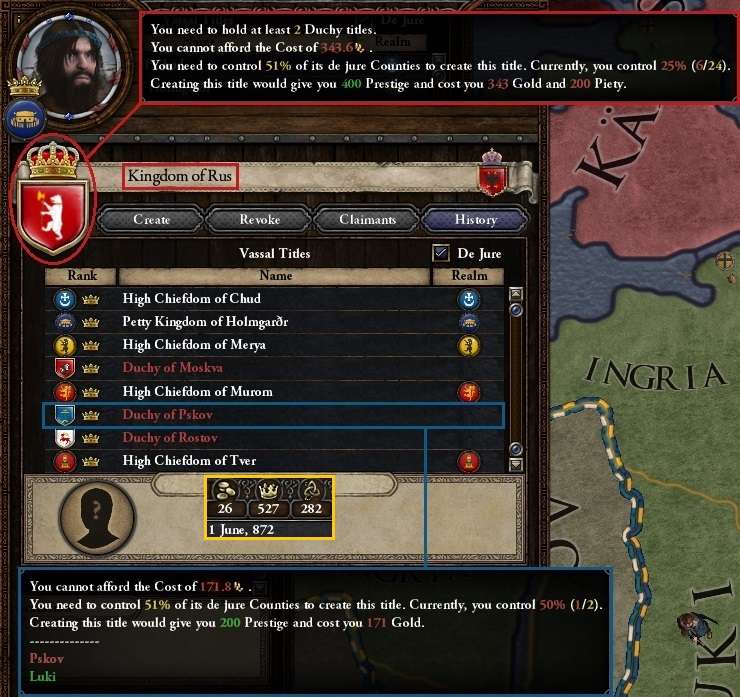
So recorded Gumarich der Schreiber on 1 June 872 CE, as the good and great of Holmgarðr awaited the return of their king – bearing the great treasure and prestige of a long and successful raid in Britannia and Ireland.
And by 9 June, the raiders and their loot were all loaded on the ships and the long voyage home began.
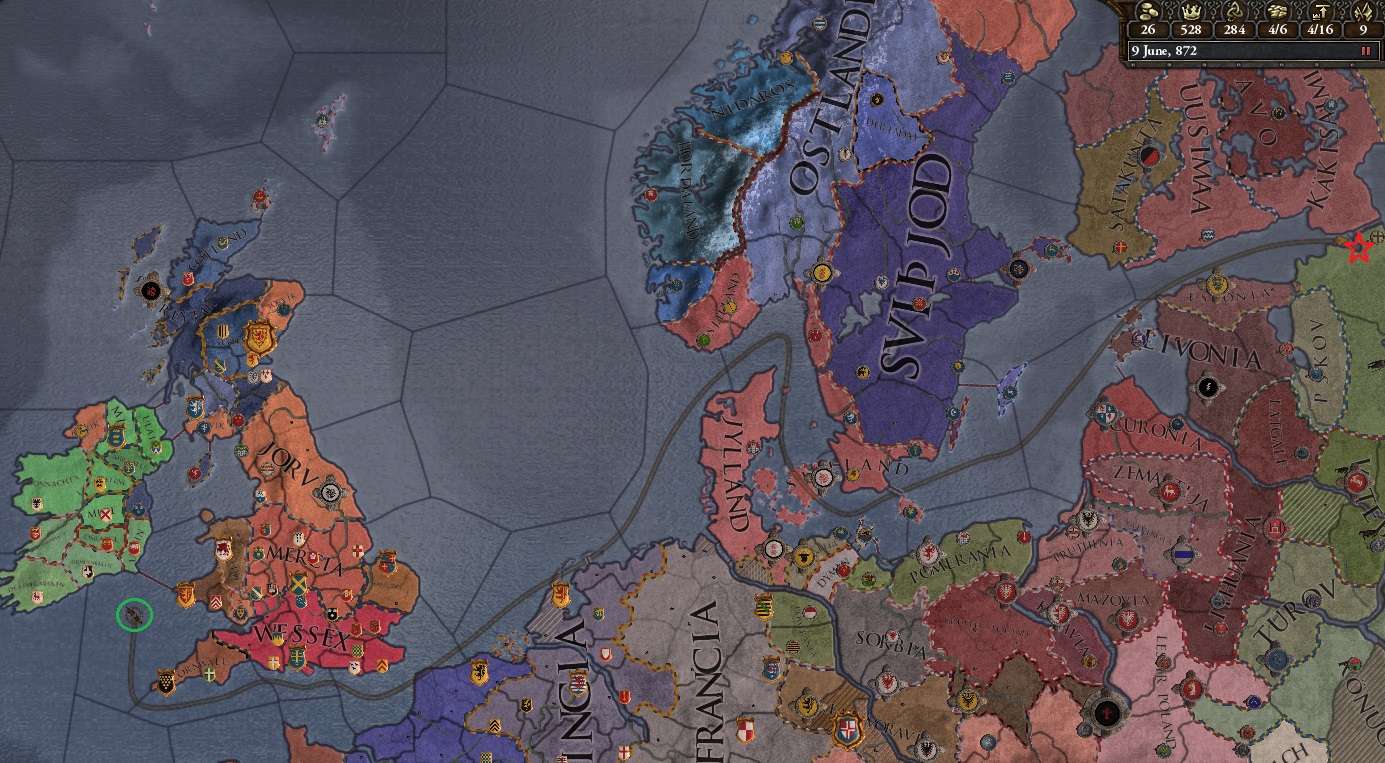
July 872
In Ladoga, the second level of tribal fortifications was completed. No more money remained for new works and Rurik still accumulates his prestige to achieve his ambition of becoming Exalted among men, so none is yet made available to be spent for martial buildings in the royal demesne.
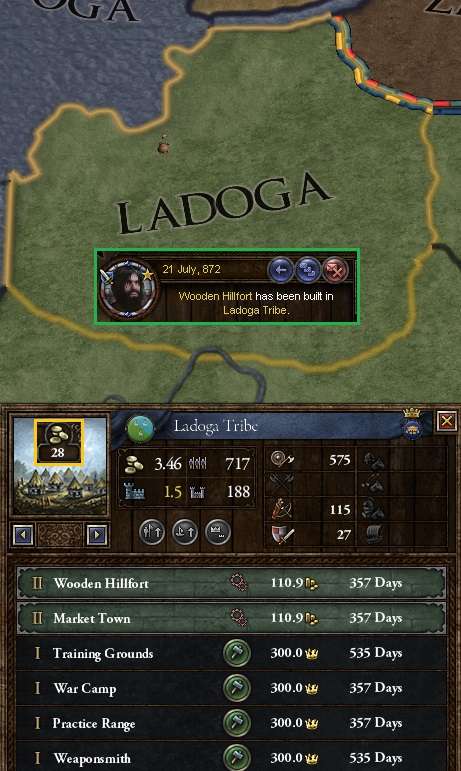
August 872
And so, on 16 August, the Great Raid of Britannia came to an end. Gold and Prestige abounded, feasting and hearty celebrations had. Enough money for emergencies filled the royal coffers and Rurik’s prestige neared its objective. Just another nudge was needed. Some quick and prestigious exploit …
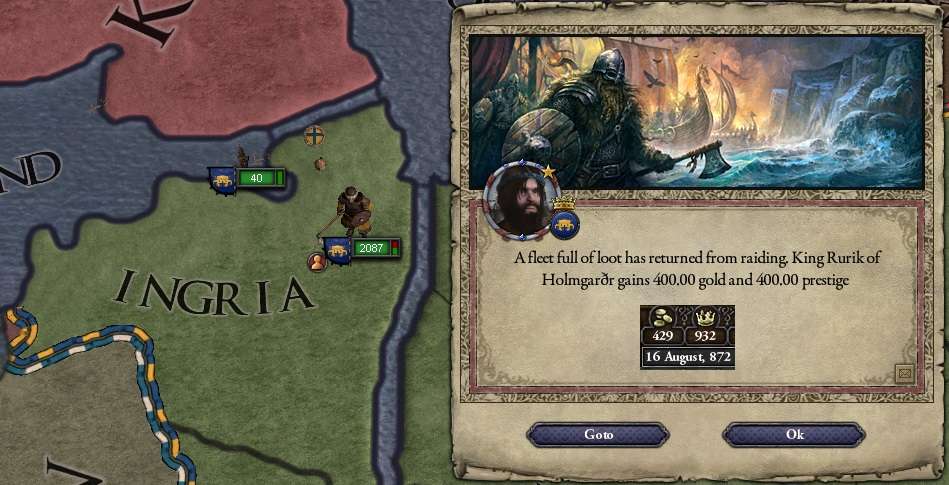
… so, that evening Rurik took counsel with his Chancellor, who had made a quick dash up from Luki to Ingria, to brief his newly returned king on his thoughts on the ambition for a greater kingdom of Rus. The king asked a blunt question.
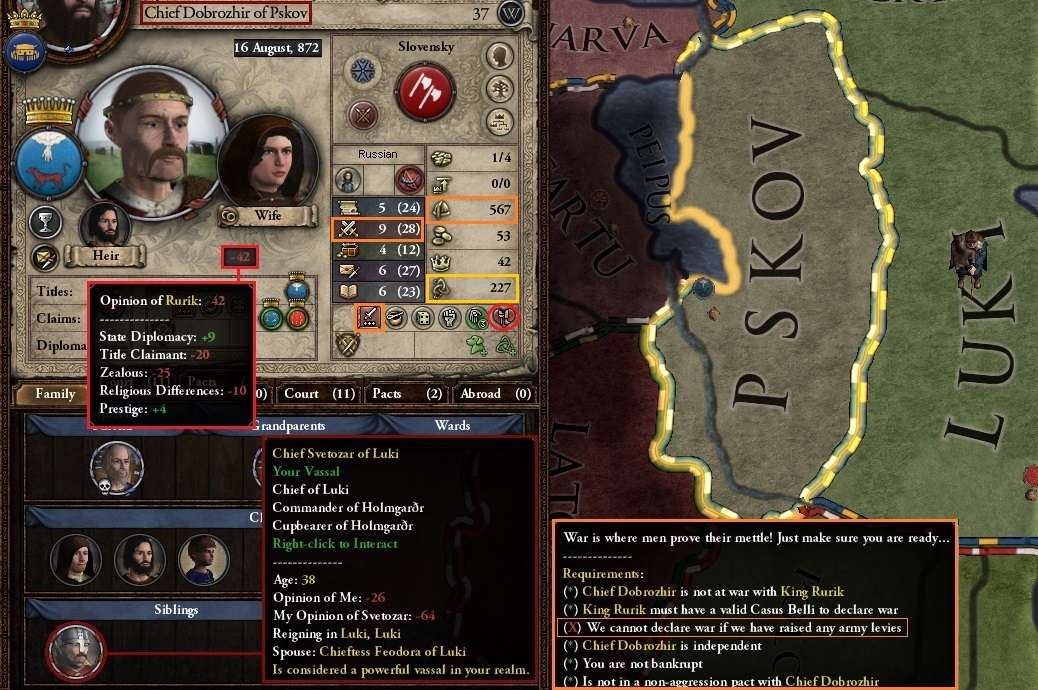
A week later, celebrations finished and levies dismissed, Rurik held a war council with is senior commanders – Sverker and Dan – and Chief Nuyanza, in whose hold of Nöteborg in Ingria they are currently taking their ease. The king is in a feisty and confident mood.
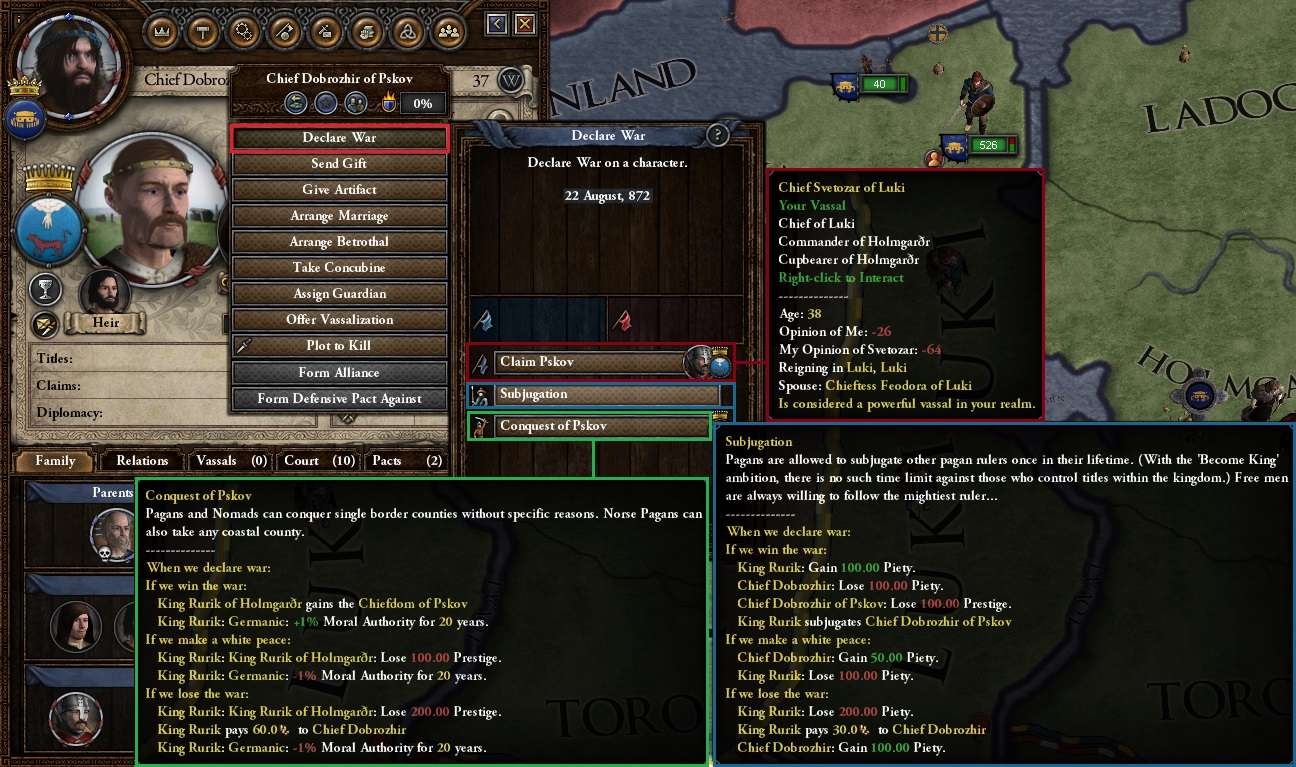
That done and the declaration of war despatched to Dobrozhir by messenger, talk turned to mobilisation. Rurik said he had received a note from his son in Nygarðr, the family holding in the capital of Holmgarðr.

Sverker, who now acts as Rurik’s military deputy in the field, speaks up next. “Then my Konungr, the logical step is to recall the royal demesne levies. Those from Holmgarðr and Ladoga can be here quickly – and are greater in number than they were due to all the good recent works done there and they are fresh in strength having only been recently released. Those in Toropets and Torzhok can also be called, though they are fewer in number and will take a long time to reinforce to full strength.”
Dan chimes in too. “The vassal chiefs will not, under our tribal laws, provide liege levies for such purposes, but they could be called upon to provide forces as allies. They would then each choose according to their own sense of duty to the realm and their personal desires. Godi þorolfr would, of course, once again provide his small liege levy if requested – it currently numbers around 40 men.”
“Call up my own levies, at once. I think the troops of Holmgarðr and Ladoga will be quite sufficient for this task, as they were in Toropets and Torzhok, but by all means let us also get the troops from those two provinces gathered too – their numbers later could be useful and I would see them getting some early battle experience and to build their numbers. I will have need of them once this pesky flea in Pskov is squashed.”
“And we will not bother the Godi for his men, nor is there any need to call the vassals to arms. Not that I am confident they would all answer such a call – for another war of conquest on a Slovensky, I think my two Chiefs of the same family would be reluctant to join.” Rurik pauses and considers a map. “Depleted as it now is, I will take my personal regiment immediately to Pskov, as we did previously, to see if I can prevent the assembly of his meagre levy or, if not, give it battle. The slight lack of numbers by comparison will be matched by his lameness and lack of military skill. I will best him personally if he dares to meet me in the field. Issue the orders, I march straight away to Pskov myself. You bring on the main force once it is assembled in Ingria and we will complete the job, in quick time.”
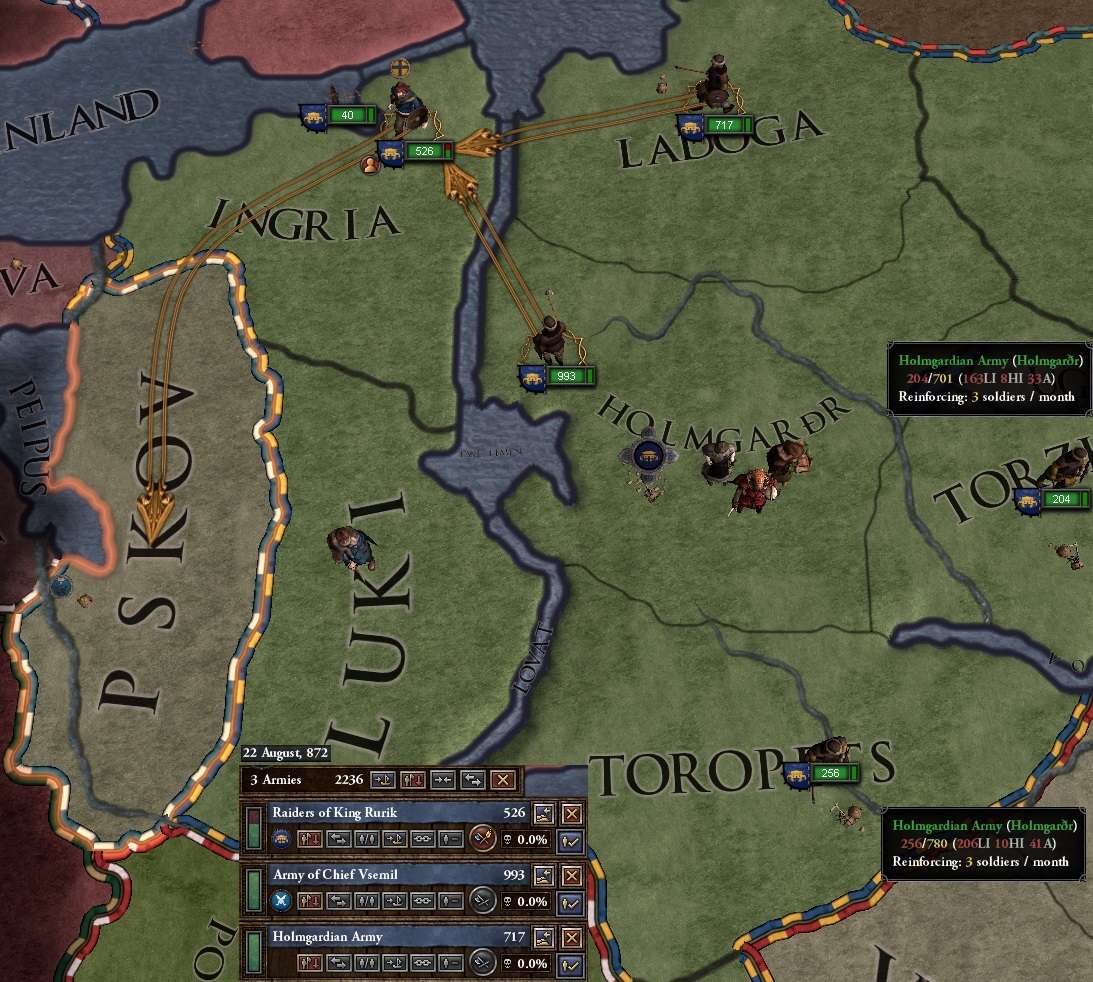
A little over a week later, as Rurik is on the road to Pskov, the messenger he sent there to deliver the declaration of war returns along the same road. His horse and that of his small escort are all lathered.
September 872
More pleasant news comes Rurik’s way.
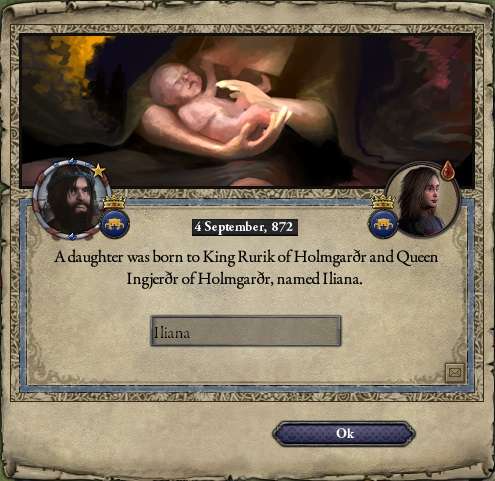
Iliana will be sent back to the court Nygarðr for her upbringing, while the Queen stays in Constantinople.
Less pleasant news is received the same day. Dobrozhir and his ‘Army of Arvet’ is now on the march to Ingria! It is estimated he will arrive on 27 September; the levies from Holmgarðr and Ladoga should arrive before then. A stand will be made in Ingria: just in case, the incompletely raised levies from Toropets and Torzhok are now summoned. They may not arrive in time for the battle, but may be needed as reinforcements later.
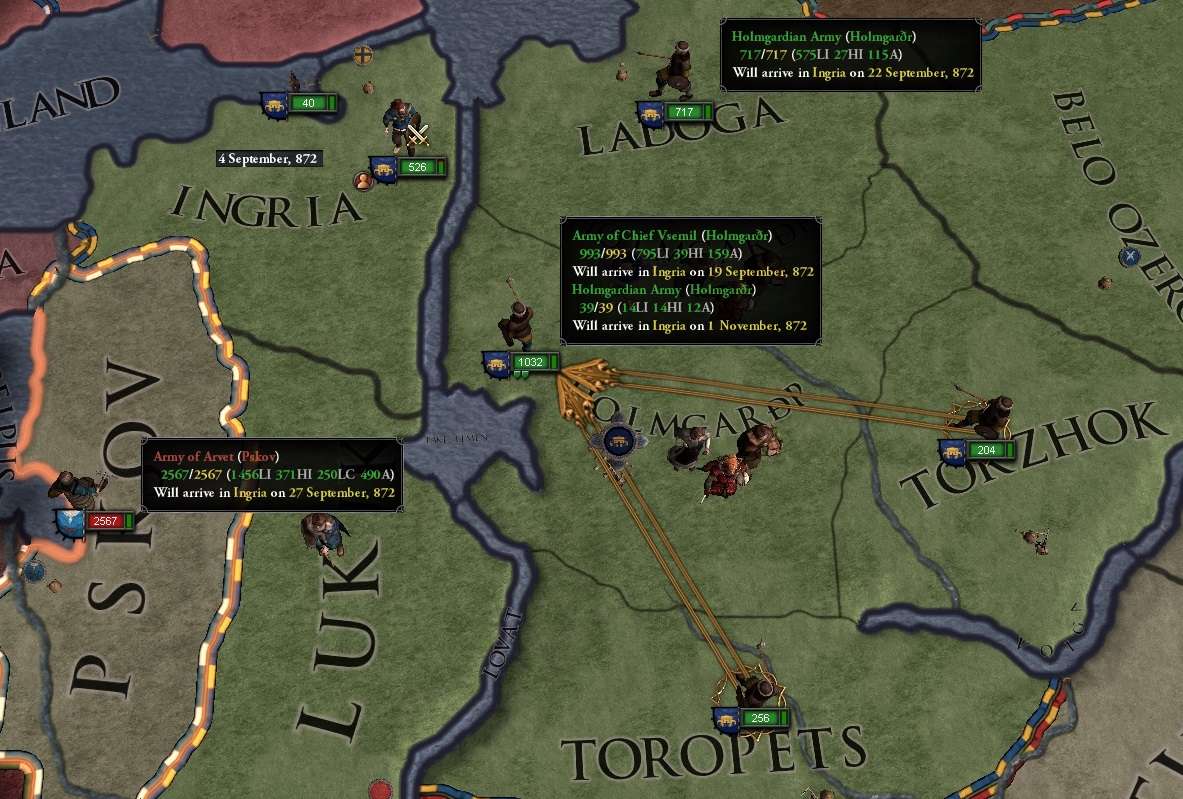
By 23 September, both the main levy groups had arrived. Vsemil came with them, automatically answering the call as one of Rurik’s designated commanders. Maybe he’s not so bad after all – certainly better than his relative Svetozar. He replaces Dan on the left wing, given his slightly higher martial prowess. The fleet is sent out to sea – just in case: if things go badly, perhaps it could be captured by those bothersome Pskovans if it remains at anchor in Ingria.
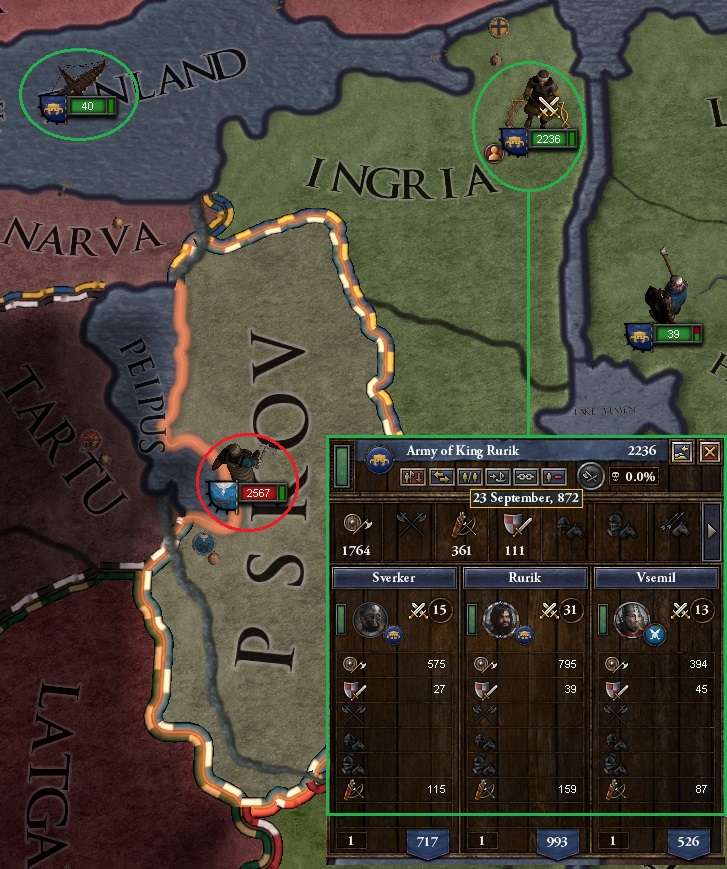
The Battle of Ingria Tribe starts on 28 September [NB: for battles, I will just take the time span the game attributes to these, rather than the more literary – and realistic – AAR convention of describing it as occurring in a single day.] Apart from an overall lack of numbers compared to the attackers, in retrospect the enemy’s advantages in archers, heavy infantry and cavalry are telling, even though they only have the two flanks manned and have far less effective commanders.
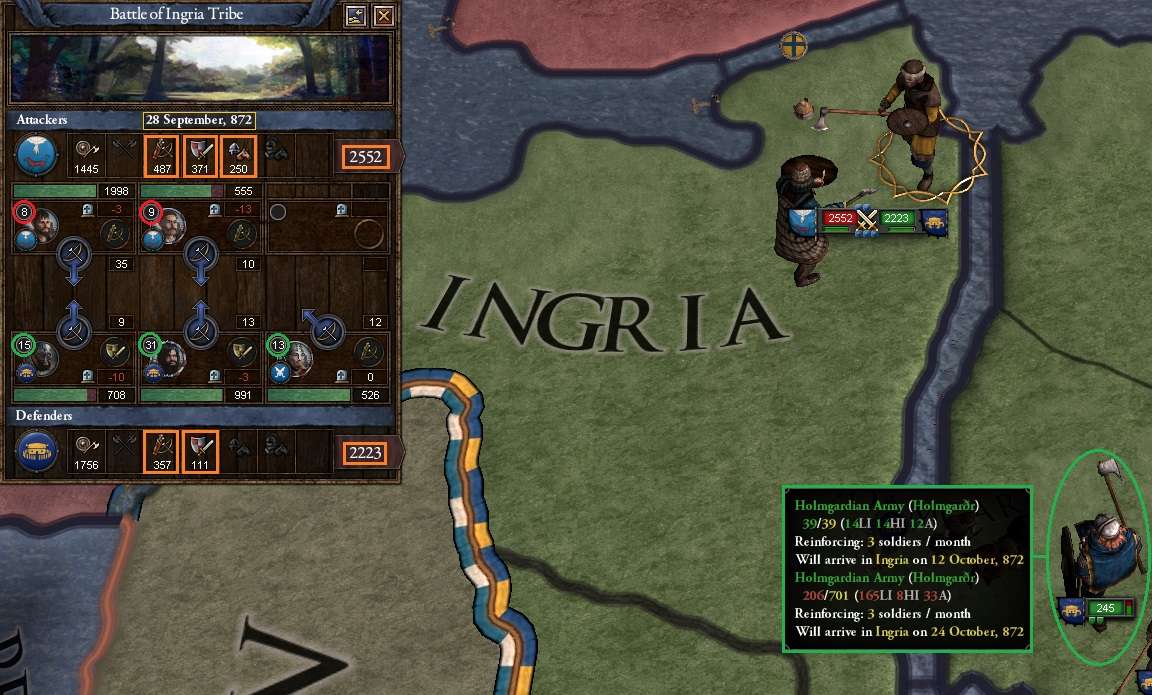
As Rurik takes his rest after the second day of the battle, he is approached by a comely young Norse lass. He reminds him somewhat of his absent Queen. Edla is apparently visiting Nöteborg (her place of birth) and has made a bit of an impression on Rurik. He briefly notices she is married, but doesn’t pay any attention to whom. He has been away for a few years and can’t recall the names and backgrounds of all the courtiers. Anyway, there is a battle to be won! They exchange a few polite pleasantries and go on their respective ways. [You will have to wait until a little later to see which path Rurik chose.]
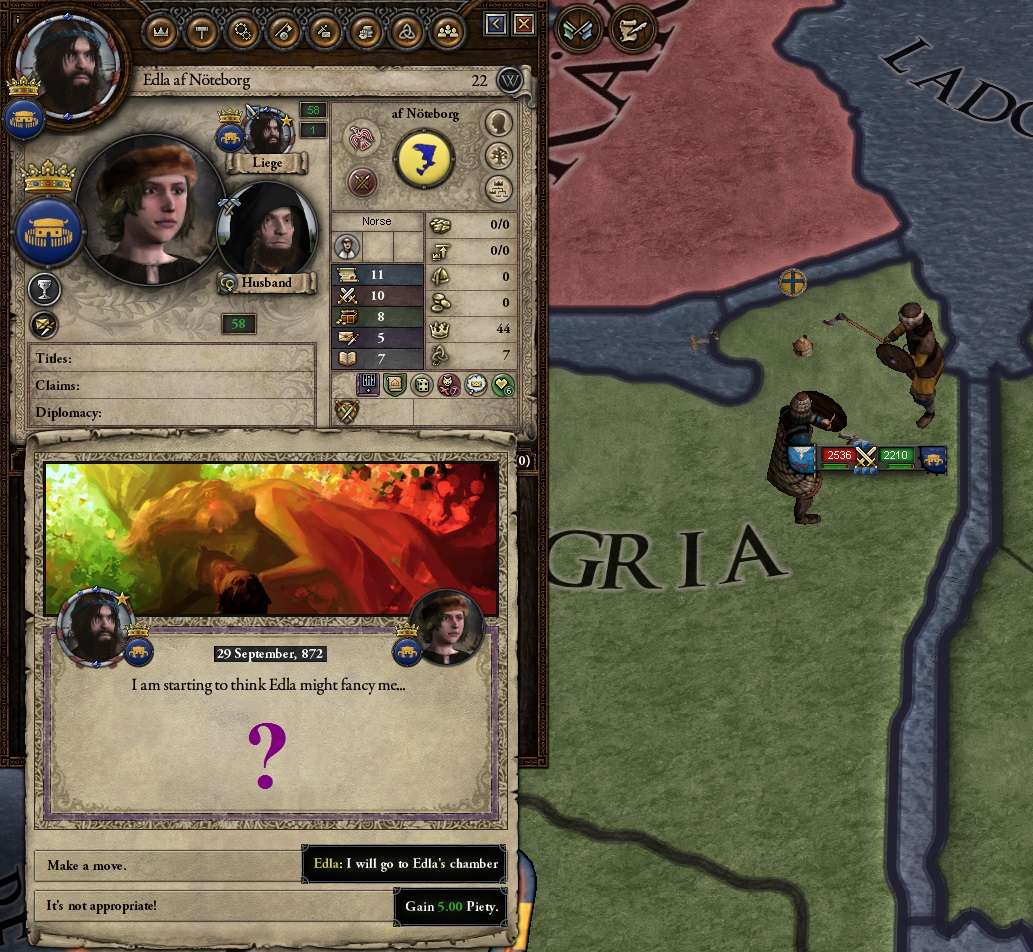
October 872
As the battle progresses, Rurik looks a little anxiously at the reports that estimate when those other levies – all now in Holmgarðr but at different stages of the march - will be in place. Not for a while yet.
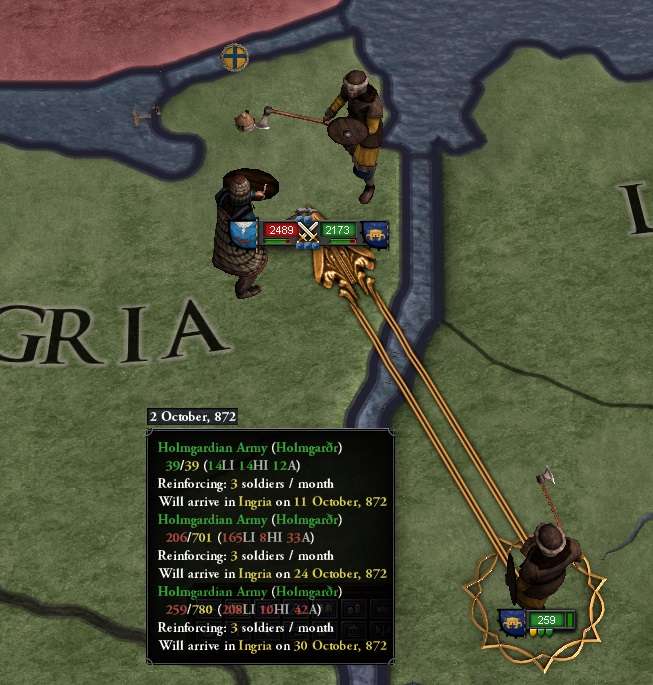
By 4 October, the fighting is taking its toll on both sides. Dobrozhir of Pskov breaks first in the centre – good news. But Sverker breaks soon after on Rurik’s left, not only negating but outweighing their gain in the centre. Rurik will again be outnumbered, and it is against the main Devout Warrior host – with its superiority in heavy infantry and its light cavalry squadron.
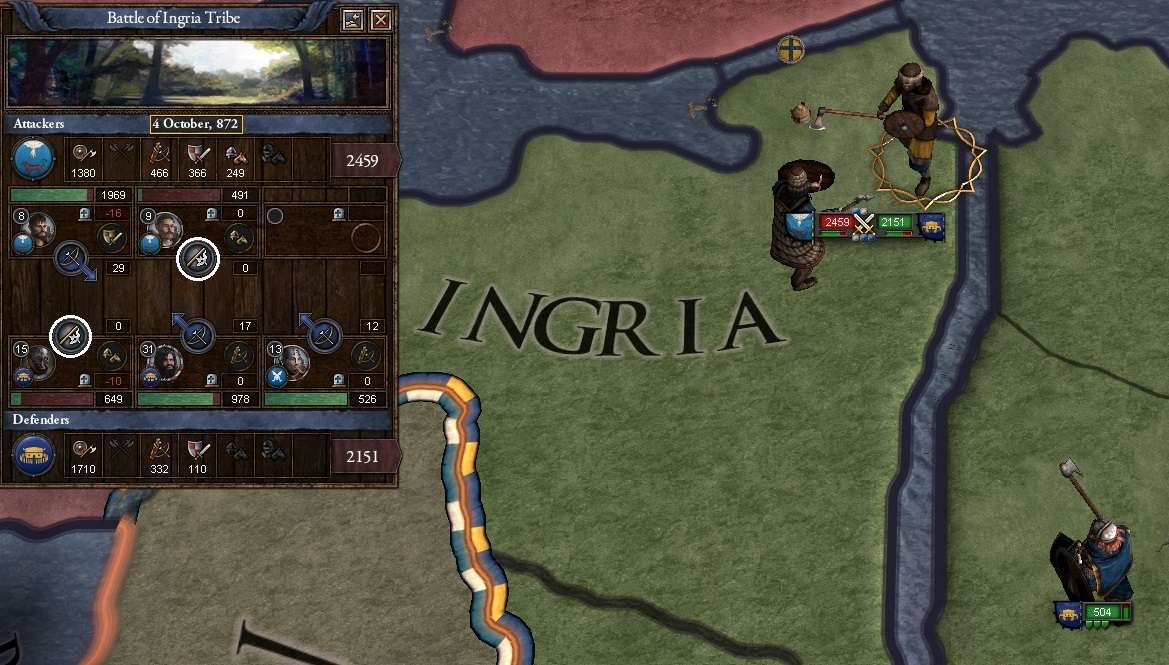
Two days later, Rurik is wound tense as he senses the battle turning against him, despite all his efforts – he is concerned the reinforcements on their way will be too late, too little or both. He adjourns to his room in the nearby Nöteborg keep of Nuyanza. He falls into a disturbed sleep …
As feared, with the reduced forces on the battlefield, the attacker’s advantages in numbers, heavy infantry, cavalry and archers are continuing to tell. By 12 October, the resumption of archery skirmishing seems to be favouring the enemy and the morale of Rurik’s key central regiment is beginning to falter. Even if they last long enough for the reinforcements to arrive, they look unlikely to be enough to turn the tide. But the fight continues, with Rurik hoping for something to turn the tide.
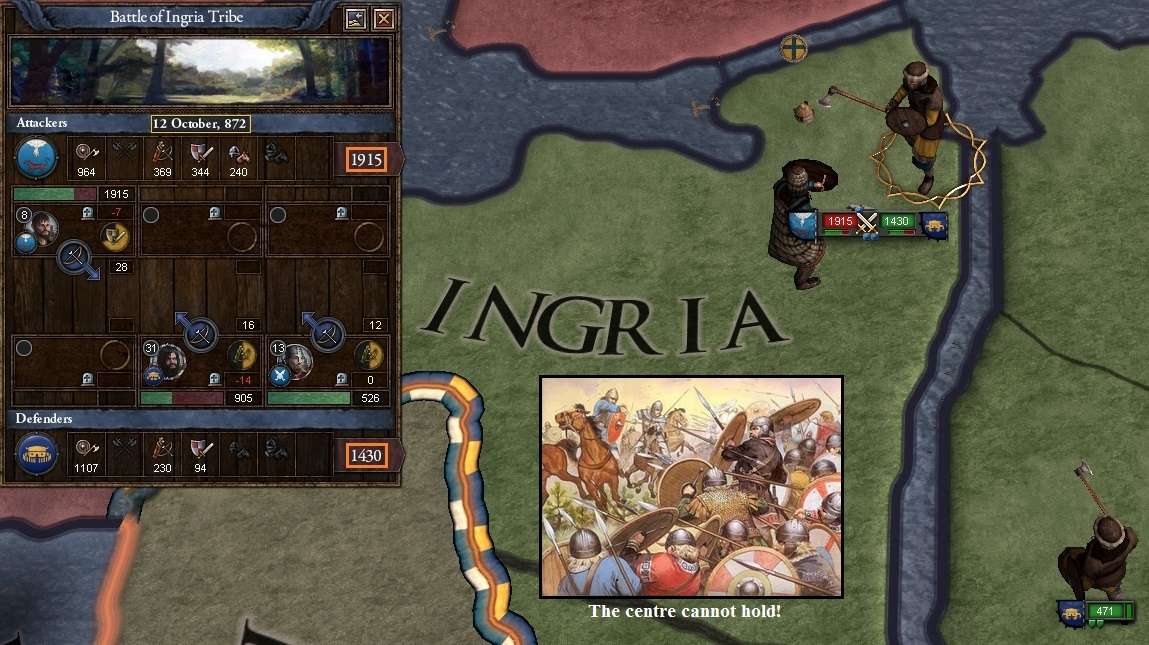
Sure enough, while some of the reinforcements arrived before the battle was finally decided, they were not enough. All they ended up doing was to provide a leaderless rear-guard to be butchered after the centre and right wing fled the field. By 24 October, the cause was hopeless. Damn, thought Rurik, I should have sent word for them to turn back once the tide had turned two weeks ago. I have sacrificed my men needlessly!
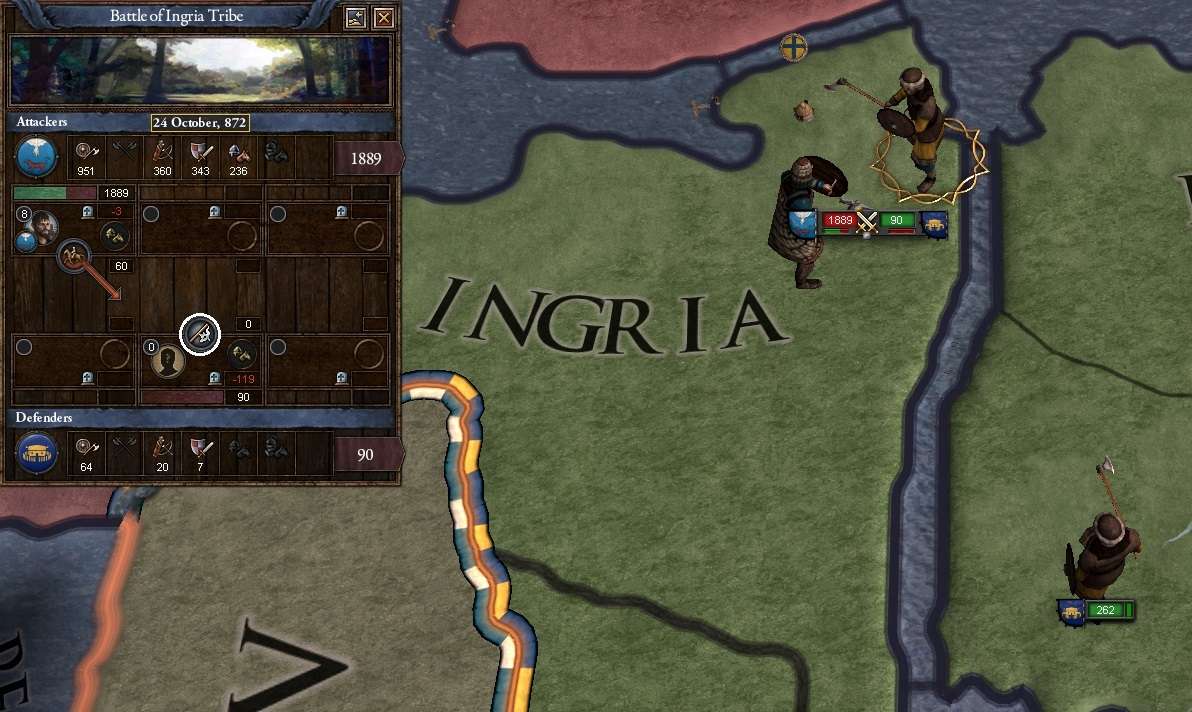
And by 29 October, the Battle of Ingria Tribe ends in ignominious defeat! Curses to those infidel warriors – they may be heathens, but they are certainly effective! If not for them, Dobrozhir’s head would have been on a plate by now. The army has suffered heavy but not terminal losses. It flees in uncontrolled rout all the way to Smaleskja! Dobrozhir now has the advantage in the war and puts the tribal holding in Ingria to siege!
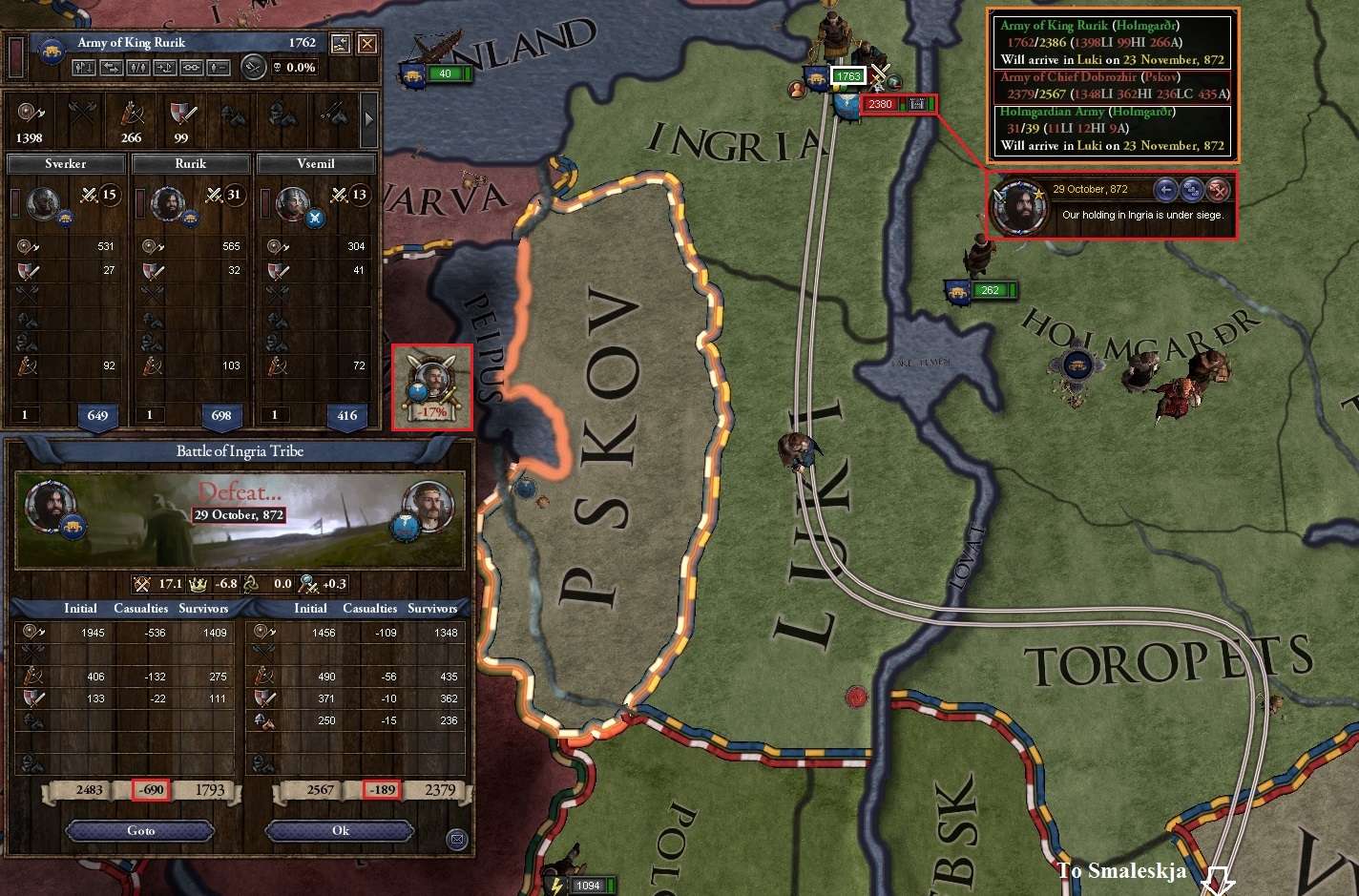
As the army retreated from Ingria, Rurik had already diverted to his capital holding of Nygarðr. He arrived there the day the last Holmgarðian troops were being swept from the field in Ingria. It is time now for Plan C!
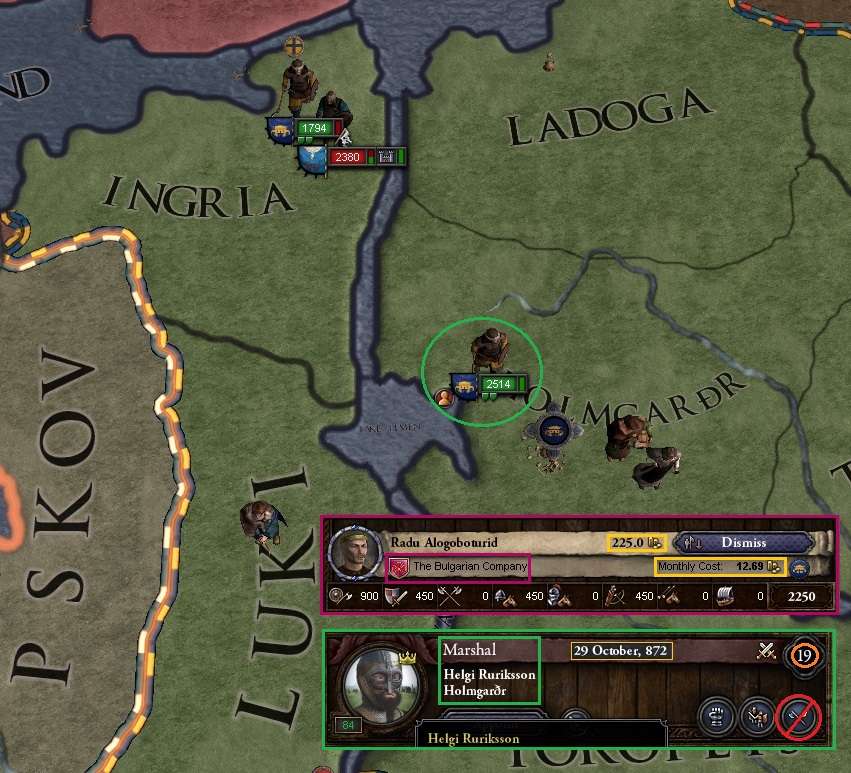
November 872
Three days later, they are on the road to Ingria.
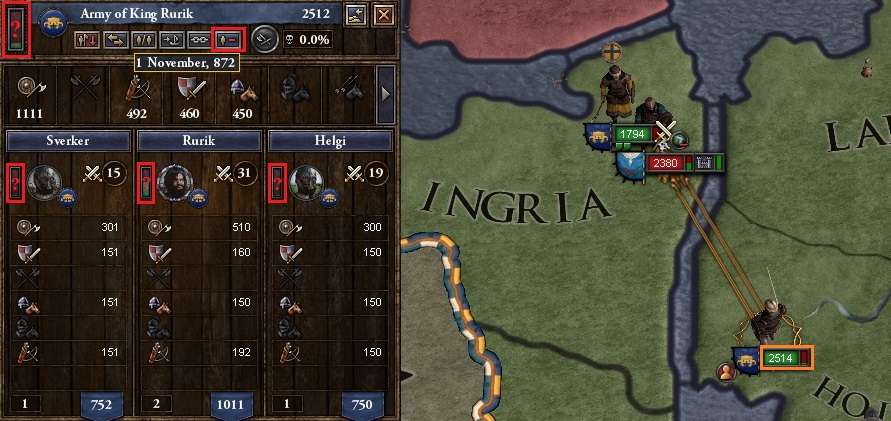
In the meantime, Dobrozhir and his damned Devout Warriors are reducing Ingria's fort. Its garrison is only small – Rurik hopes he can relieve them before it is taken and the attacker’s morale has fully recovered.
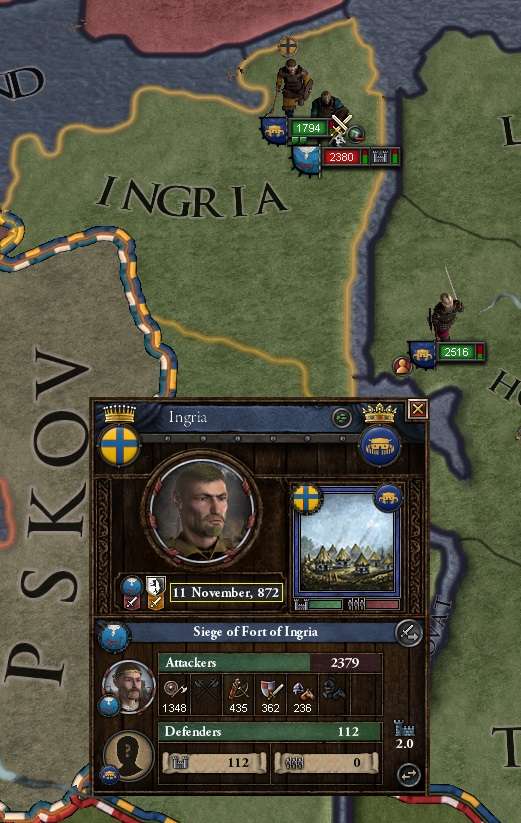
Back in the capital, the stone hillfort is completed. Rurik hopes it won’t be needed for an actual defence of his home county!
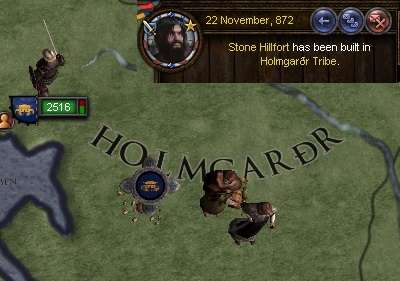
December 872
On 12 December, Rurik’s new – mainly mercenary – force arrives in Ingria. The Second Battle of Ingria Tribe is joined - just in time to relieve the fort’s defenders! This time he has the advantage in overall numbers, but especially in archers, heavy infantry and cavalry – as well as leadership. Dobrozhir, in the centre again, collapses quickly – the morale of his troops clearly started well below that of his devout allies.
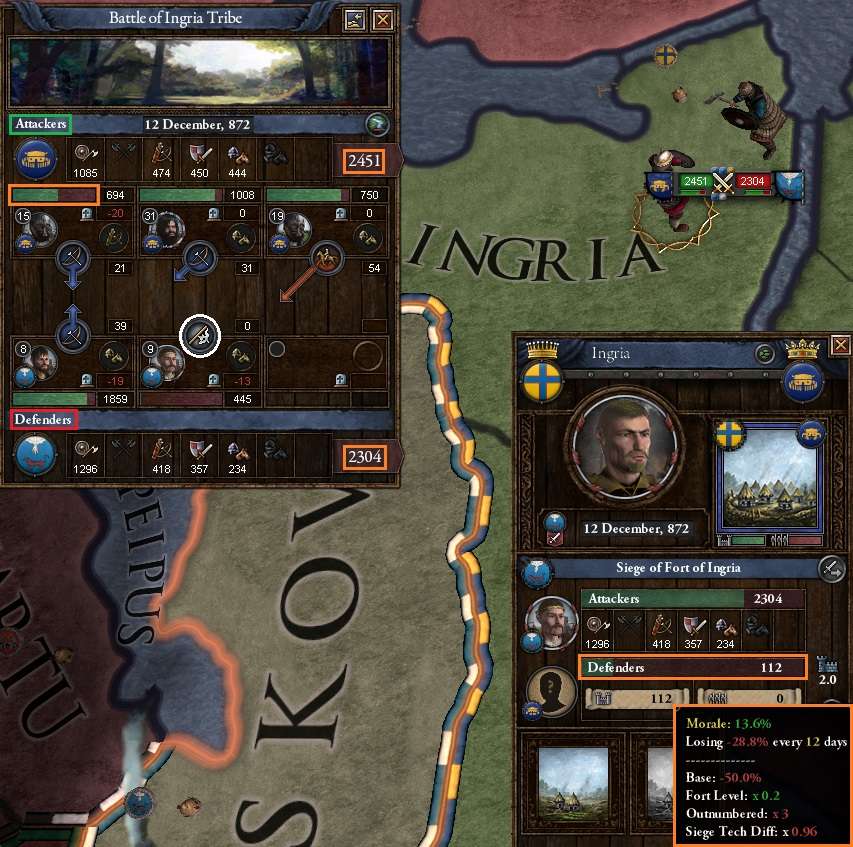
Sverker is finding it hard on the right against those worthies and is bearing the brunt of the casualties. The morale of that wing, not fully recovered on the approach to Ingria, is already suffering. But Rurik is able to concentrate his archers on the enemy, while Helgi takes his unchallenged regiment on the left wing across. Though it is not clear whether this will end in pursuit of the retreating enemy centre (which he is currently doing), or him joining the fray against the enemy’s left. But things are looking much better in this battle than in the last – forward to victory!
Back in the realm, more military infrastructure is completed.
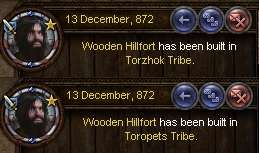
By 15 December, after three days of combat, Sverker has once again fled the field, with the Pskovan Devout Warrior band turning on Rurik’s centre – where he is now badly outnumbered. It looks [from my uneducated reading of the screenshot] that Helgi is still pursuing the retreating enemy centre rather than closing with the enemy’s left [Is this right?]. But morale in Rurik’s and Helgi’s wings still seem to be better than the enemy’s, though total numbers are now about even again.
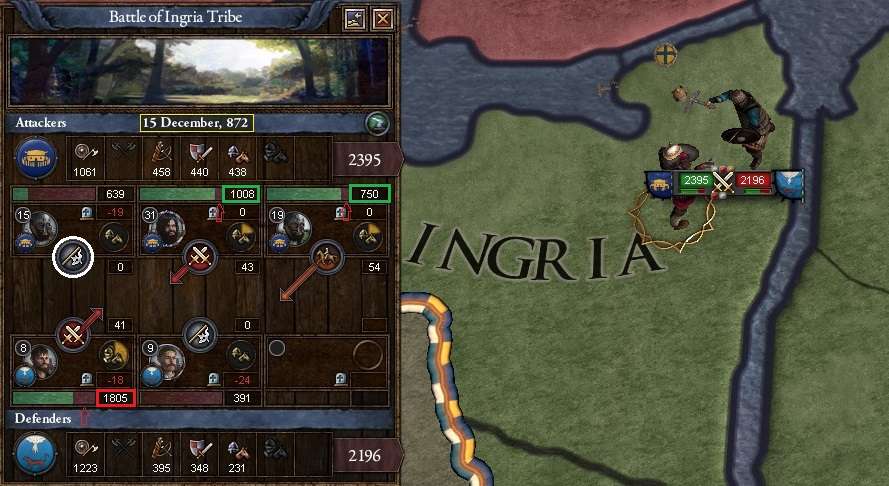
Five days later, and Rurik’s centre has collapsed, suffering some nasty casualties as they flee. Helgi has has seen off the enemy centre and now joins combat with the enemy – though it looks too late: even if the morale of his troops is higher, he is outnumbered more than two-to-one. Still, he presses the attack and is causing the enemy some grief, at least.
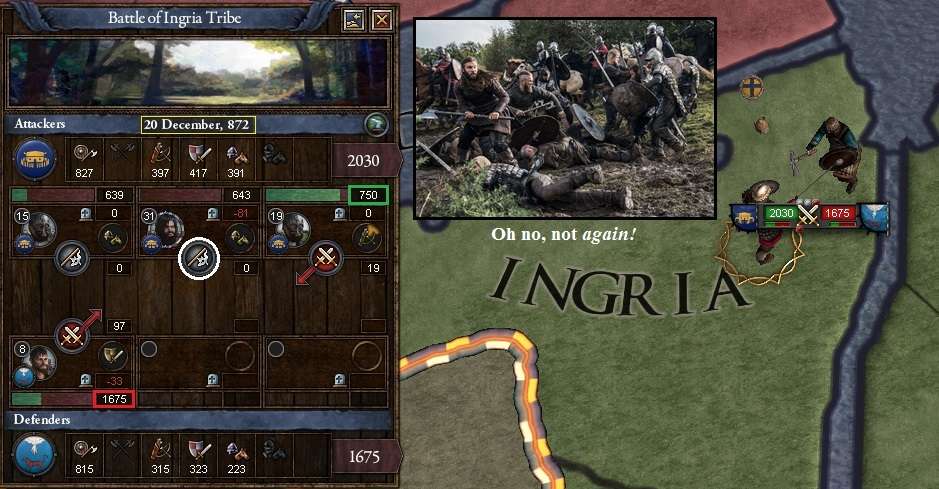
Even as Rurik tries to rally his fleeing troops and knows not how his son now fares, fighting to the end alone in Ingria, the tough lessons of this war against Pskov have improved Rurik’s military prowess – with experience won the hard way.
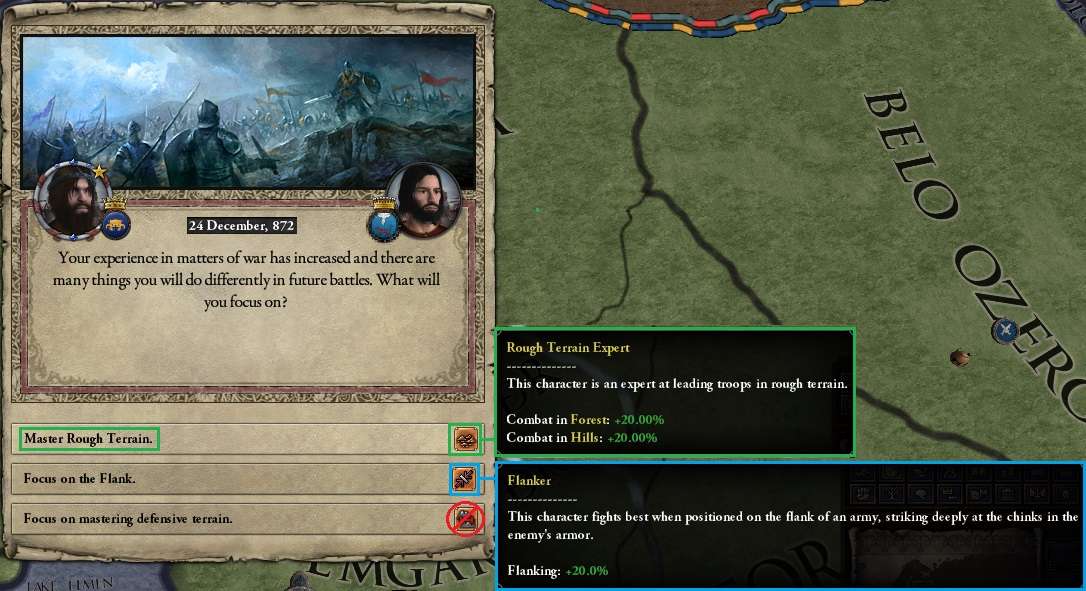
Rurik devotes this newfound acumen to the mastery of fighting in rough terrain. This will suit the many forests in this part of the world. A mastery of flanking attacks may be useful, but his place is in the centre – and despite this recent chastening experience, he does not intend to be sitting on the defensive more than the absolute minimum. So rough terrain it is!
Word comes through on 31 December – the year ends in another defeat.
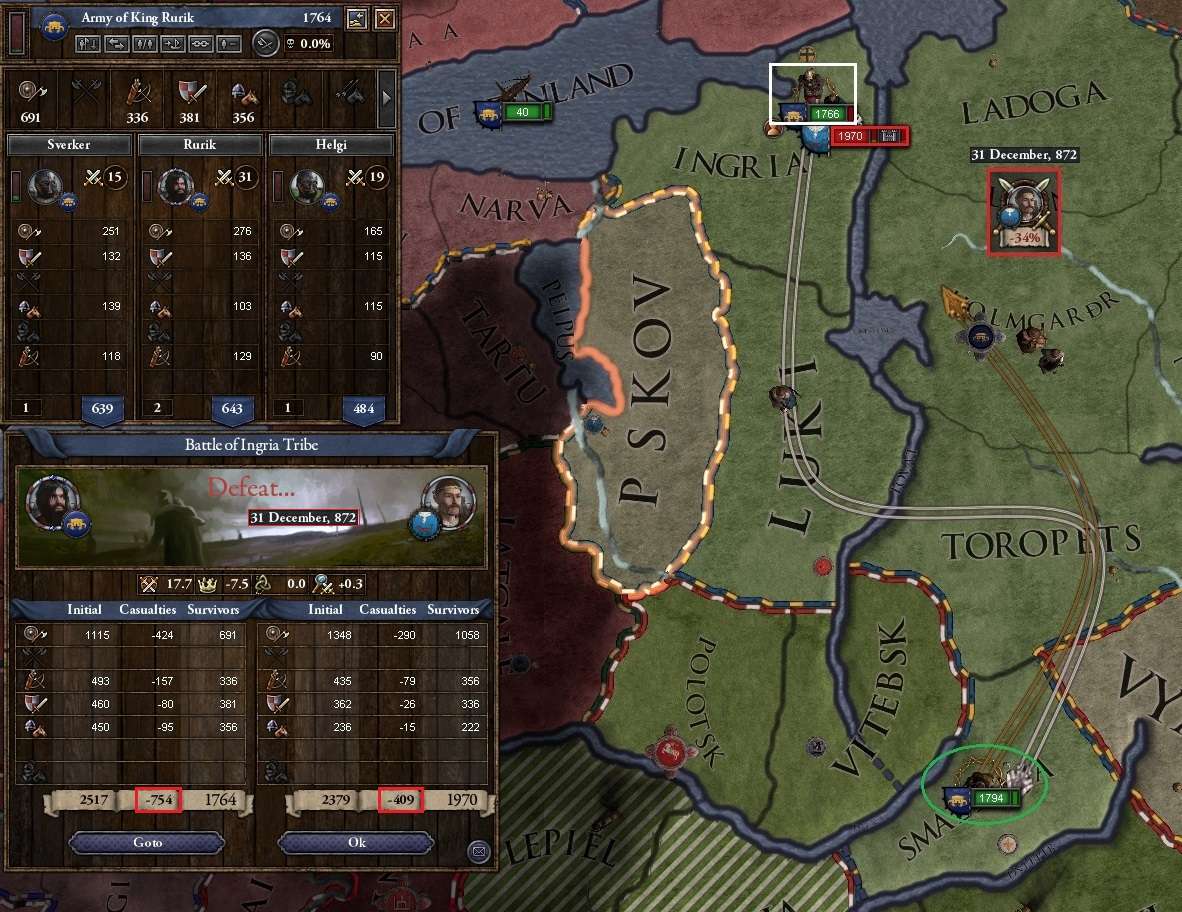
This time, what had seemed so promising at the start turned again to ignominy. Twice the enemy’s leader has fled early, but twice his band of Devout Warriors have saved his bacon! Double damnation! Dobrozhir’s position in the conflict improves again, on the back of his holy fanatics. But his strength and morale have again been damaged, even while he continues his siege of Nuyanza’s holding in Ingria.
But again, while casualties have been heavy for Holmgarðr, the battle was not quite so one-sided this time. That said, Rurik searches for some reasons for this second loss: he wonders why the morale of his troops was not as high at the start of this march as they should have been. And why, with the early loss of the enemy centre, couldn’t they take that initiative to win the day? Should he have positioned the relative strengths of his three battles differently this time? Or was it something about the standard and experience of the mercenaries he had hired that counted against them – something he should have looked to more closely before the battle?
Also, he now realises that, in his haste to close with the enemy again, this time he did so from a less tactically advantageous position – across a river. Might that have cost the difference between victory and defeat this time round? Despite better martial abilities and, in this second battle, a superiority in the kind of troops the enemy had the advantage of last time, they had still lost.
His immediate conclusions, as dictated at the time to Gumarich der Schreiber, and pending a more thorough analysis of the campaign which would come later, were the following:

Rule 1. Han Solo may not be one of the traditional Norse Gods - but he should have been!
Ch 14 Q4: Field Battles. Bearing in mind the rest of this campaign has been fought out but still seeking to learn as much from this opening six months few months as possible, I’ll pose a few other questions (to add to those mentioned above in the commentary and in Rurik’s reflections. Are there other factors here I’ve ignored or should have looked at more closely? Should I next time record some of the ‘mouse-over’ battle stats that come up for any pointers about what has gone on – or is that really just pre-ordained and there for flavour? Any pertinent tips or tactics welcome.
So, as an eventful year closes, Rurik invites all his military advisers to continue to offer their views of the war of conquest on Pskov and the prosecution of its first period. This request remains open whether those views are provided now or after its conclusion. The lessons will be equally relevant then. In the meantime, Rurik and his commanders remain determined to retrieve the situation, even while the enemy despoils Ingria. They will now concentrate both the defeated armies in the capital province of Holmgarðr and consider their next steps. One of which is a call for his vassals to join as allies.
Questions
Ch 14 Learning Point 1: Devout Warriors. Well, as I was playing on from here and wanted to quickly find out what the hell had happened here, I did a quick search and found this info in a dev diary and a thread comment: “First of all, Defensive Pagans now have the ability to summon bands of Devout Warriors if they are the primary defender against an enemy of a different religion at the cost of 200 piety. Overall this is rather like the Raise Tribal Army decision and gives Defensive Pagans some extra punch when attacked.” Looks like it’s 2,000 troops per 200 Piety, in a defensive war. And you can see Dobrozhir, who started with 227 Piety, now has 26, plus 2,000 event spawned troops. I’m glad he didn’t have 400+ piety!!
Ch 14 Q1: Fleets at Port. Is that right? If a fleet is in port when a province is taken, is it captured or destroyed? Or does it automatically escape to sea?
Ch 14 Q2: Looter Toggle (again). Another minor learning point: when I couldn’t get the forces to merge at first, I discovered the looting toggle was still on with Rurik’s Raiders, and it was apparently preventing the merger. I switched it off and that allowed them to merge as usual. That raiding toggle is no end of arcane trouble for a CK2 neophyte! So, I also assume had I proceeded to move that force into Pskov, it would have been treated as a raiding instead of an invading force – until such time as I discovered and changed it?
Ch 14 Q3: Morale. OK, it was only later that I noticed a few things I didn’t at the time. The first is this issue of morale. Before they set out (after they were called up) this new army seemed to have a full green bar of morale (on the main map icon, anyway). Yet now, as I look back on the screenshot, I see the morale of Helgi’s and Sverker’s wings are suddenly near zero, and of Rurik’s only about 50%. I wonder what has caused this? Is it specific to the commander and residual from the battle just fought – and lost? But then, given Helgi has only just been assigned, that should not apply to him. If it is to the troops, why is it suddenly so low? Is there some ramping-up period for the mercs to come to full morale that I didn’t notice at the time? Or something about changing commanders on them (which again I hadn’t noticed before)? Any knowledge or pointers on this aspect, or what the causes of this lowered morale might have been, very welcome.
Ch 14 Q4: Field Battles. Bearing in mind the rest of this campaign has been fought out but still seeking to learn as much from this opening six months few months as possible, I’ll pose a few other questions (to add to those mentioned above in the commentary and in Rurik’s reflections. Are there other factors here I’ve ignored or should have looked at more closely? Should I next time record some of the ‘mouse-over’ battle stats that come up for any pointers about what has gone on – or is that really just pre-ordained and there for flavour? Any pertinent tips or tactics welcome.

Mímir (Old Norse "The rememberer, the wise one") or Mim is a figure in Norse mythology renowned for his knowledge and wisdom who is beheaded during the Æsir-Vanir War. Afterward, the god Odin carries around Mímir's head and it recites secret knowledge and counsel to him.
Rurik decides to remind himself constantly of Mímir’s fate – despite his legendary wisdom, he still lost his head. He would rather not lose his, even if he continues to revere and serve the All-Father, as Mímir did. He is and wishes to remain rather attached to his body. Especially with young Edla around! That said, some secret knowledge and counsel whispered to him right now would be most welcome – as it always is.
Foreword – AuthAAR’s Note
Well, this last was a very enjoyable session to play! Lots learned – a lot of it painfully. I will pose questions along the way, but in answering please note that for narrative purposes, I have played this ‘bloody business’ through to its conclusion. It was just too much, I felt, for a single chapter. I picked an appropriate point for a break in the story – which also happened to be New Year’s Eve 872! How serendipitous.
So any advice or answers from this first of a double-barrelled instalment are for posterity and the ‘next time’ – it won’t be that I’m ignoring such advice when I present the second instalment. Writing it up and re-examining some of the saved screens have already indicated some lessons/errors I made. Some I was able to apply as I went, others I only saw after the conclusion was reached – which I won’t spoil by giving away now or in feedback to any responses from this episode.
And a final couple of notes on presentation: first, you may have noticed, but I have sometimes cited events that some may pass over or have gone into them in more detail or presented all the choices/consequences on offer for what otherwise people might think are basic or common game events. Mainly, it’s because every one of them is new to me (this being my first proper game of CK2), so even though I may have read about them in AARs, having them happen the first time is interesting for me (you know, sieges, raiding toggles, ransoms, puppies, Blots, seductions in the middle of desperate battles … oh, what a give-away, you’ll have to read on to find out what happens there).
Second, it’s mainly a gameplay and learning AAR with some narrative and character work. So, in the following two chapters – where there is plenty of blood and battle – there will be some narrative, but not as much as if this were a full-blown lyrical and literary work. I like to have a bit of that in the AAR so it is not purely mechanical, but if I was to go into too much of that descriptive detail, it would take a long time without getting to the point. Rather like this foreword! So, with that, on to Rurik’s next adventure.
ᚔ ᚱᚢᚱᛁ ᚲᛁᛞ ᚔ
June 872
“The trusty Chancellor and Lawspeaker Hrörekr, ever efficient and obliging in anticipation of his Konungr’s needs, did prepare fulsome notes on the legendary Kingdom of Rus. The cost in counties to be conquered, duchies to be founded, gold to be paid and the pious devotion to the Norse Gods required to complete this great task were duly noted.”
“Of special interest was the potential Duchy of Pskov. One county – Luki, held by Chief Svetozar Slovensky – is already part of the realm. It simply requires the addition of the namesake neighbouring province of Pskov to be made a theoretical possibility for founding under our King.”
“Of special interest was the potential Duchy of Pskov. One county – Luki, held by Chief Svetozar Slovensky – is already part of the realm. It simply requires the addition of the namesake neighbouring province of Pskov to be made a theoretical possibility for founding under our King.”

So recorded Gumarich der Schreiber on 1 June 872 CE, as the good and great of Holmgarðr awaited the return of their king – bearing the great treasure and prestige of a long and successful raid in Britannia and Ireland.
And by 9 June, the raiders and their loot were all loaded on the ships and the long voyage home began.

July 872
In Ladoga, the second level of tribal fortifications was completed. No more money remained for new works and Rurik still accumulates his prestige to achieve his ambition of becoming Exalted among men, so none is yet made available to be spent for martial buildings in the royal demesne.

August 872
And so, on 16 August, the Great Raid of Britannia came to an end. Gold and Prestige abounded, feasting and hearty celebrations had. Enough money for emergencies filled the royal coffers and Rurik’s prestige neared its objective. Just another nudge was needed. Some quick and prestigious exploit …

… so, that evening Rurik took counsel with his Chancellor, who had made a quick dash up from Luki to Ingria, to brief his newly returned king on his thoughts on the ambition for a greater kingdom of Rus. The king asked a blunt question.
“Good Hrörekr, what then will I confront if, as you have effectively suggested with your findings, I do indeed attack this odious heathen who currently rules in Pskov. You know I like not the crippled heretic who rules there – nor his presumptuous claims on Holmgarðian territory.”
“My Konungr, Chief Dobrozhir of Pskov is - as you would be aware – yet another of these ubiquitous Slovenskys. Indeed, as you would recall he is brother to the self-same Svetozar on whose county of Luki he casts covetous eyes. No doubt he would like to form the de jure Duchy of Pskov. As no doubt would Svetozar, of course!”
“Svetozar – I dislike him more the better I get to know him and his works! How goes your mission to improve his opinion of my rule? Your efforts with Nuyanza were outstanding, by the way, for which you have my heartfelt thanks. I’m not sure how I can repay you.”
“It was a pleasure my Konungr and no repayment is needed. Alas, no such headway has been made with Svetozar as yet, though my work there is not yet finished.”
“Well, keep it going – for now. If you do not find success there, I will consider what to do next on that score. But for now, I want to waste no time. I’ve have been absent long and feel the years flowing past, with so much left to do – for Honour to the Gods and the creation of Rus. Let us declare war on this upstart of Pskov immediately and commence the great project now!”
“Sire, just one thing before we do. Our tribal laws require us to disband all levies before we can honourably and legally declare such war.”
“Very well then, see to it before you head back to that boor Svetozar. I’m afraid even your good graces will find a frosty reception there, even in the middle of this bounteous summer!”
“My Konungr, Chief Dobrozhir of Pskov is - as you would be aware – yet another of these ubiquitous Slovenskys. Indeed, as you would recall he is brother to the self-same Svetozar on whose county of Luki he casts covetous eyes. No doubt he would like to form the de jure Duchy of Pskov. As no doubt would Svetozar, of course!”
“Svetozar – I dislike him more the better I get to know him and his works! How goes your mission to improve his opinion of my rule? Your efforts with Nuyanza were outstanding, by the way, for which you have my heartfelt thanks. I’m not sure how I can repay you.”
“It was a pleasure my Konungr and no repayment is needed. Alas, no such headway has been made with Svetozar as yet, though my work there is not yet finished.”
“Well, keep it going – for now. If you do not find success there, I will consider what to do next on that score. But for now, I want to waste no time. I’ve have been absent long and feel the years flowing past, with so much left to do – for Honour to the Gods and the creation of Rus. Let us declare war on this upstart of Pskov immediately and commence the great project now!”
“Sire, just one thing before we do. Our tribal laws require us to disband all levies before we can honourably and legally declare such war.”
“Very well then, see to it before you head back to that boor Svetozar. I’m afraid even your good graces will find a frosty reception there, even in the middle of this bounteous summer!”

The reason for highlighting of Dobrozhir’s Piety score here will become apparent later. Some of the more experienced players reading may already have guessed …
A week later, celebrations finished and levies dismissed, Rurik held a war council with is senior commanders – Sverker and Dan – and Chief Nuyanza, in whose hold of Nöteborg in Ingria they are currently taking their ease. The king is in a feisty and confident mood.
“Men, the time for talk and rest – short though it has been following our recent long adventure – is over. I would have this Dobrozhir’s lands for the realm. As in Toropets and Torzhok before, he can only muster a small levy. I have my own views, which you can probably guess, but which of the three causes available do you think we should invoke?”

Nuyanza, as the ranking Chief present, is first to speak. “Well, Svetozar does have claim on his brother’s lands, of course. You could claim Pskov on his behalf – I’m sure he would be extremely grateful should you win and deliver it to him. I know you like him not, but, in theory anyway, this could be a way to bring the county into the realm and him closer to you.”
“Hah! I know you speak in part from duty Nuyanza, and I respect you for it. If I didn’t consider Svetozar to be a bottled spider and inveterate ingrate, your suggestion would be logical. But I won’t give him any more power as I’m sure he would only use it against me later.”
Nuyanza continues, ticking off the second option. “You could seek to make this Dobrozhir subject to your will inside the realm – and force such on him if he refuses to submit willingly.”
“Again, it seems my life’s work is to confront Slovenskys, either without or within my realm. I’ll not have another to contend with as a vassal. You all know what I would do: it is to conquer Pskov and dispose of it as I would wish. Even if this Dobrozhir goes running off to his brother in Luki for sanctuary, as Vsemil’s brothers did to him in in Belo Ozero when I tossed them out of their lands. It will be conquest!”
“Hah! I know you speak in part from duty Nuyanza, and I respect you for it. If I didn’t consider Svetozar to be a bottled spider and inveterate ingrate, your suggestion would be logical. But I won’t give him any more power as I’m sure he would only use it against me later.”
Nuyanza continues, ticking off the second option. “You could seek to make this Dobrozhir subject to your will inside the realm – and force such on him if he refuses to submit willingly.”
“Again, it seems my life’s work is to confront Slovenskys, either without or within my realm. I’ll not have another to contend with as a vassal. You all know what I would do: it is to conquer Pskov and dispose of it as I would wish. Even if this Dobrozhir goes running off to his brother in Luki for sanctuary, as Vsemil’s brothers did to him in in Belo Ozero when I tossed them out of their lands. It will be conquest!”
That done and the declaration of war despatched to Dobrozhir by messenger, talk turned to mobilisation. Rurik said he had received a note from his son in Nygarðr, the family holding in the capital of Holmgarðr.

The note read: “My father and Konungr, your great prestige in the realm is such that, should you wish it, you might raise a great tribal host to aid you in your conquest of Pskov. I can send out the notice should you wish me to do so.”
“My son is, as ever, thoughtful and diligent. But high though my standing in the realm may be, I find myself near to my position of being held an Exalted leader among the people. I wish to use that prestige, once that ambition is achieved – and it is close now, I can feel it – to build martial facilities to improve my armies. Having to trade on it now would take much lustre from my reputation – especially against this poorly-armed pipsqueak in Pskov. This is only a course I would take in extreme need, though it is good to know it is there.”Sverker, who now acts as Rurik’s military deputy in the field, speaks up next. “Then my Konungr, the logical step is to recall the royal demesne levies. Those from Holmgarðr and Ladoga can be here quickly – and are greater in number than they were due to all the good recent works done there and they are fresh in strength having only been recently released. Those in Toropets and Torzhok can also be called, though they are fewer in number and will take a long time to reinforce to full strength.”
Dan chimes in too. “The vassal chiefs will not, under our tribal laws, provide liege levies for such purposes, but they could be called upon to provide forces as allies. They would then each choose according to their own sense of duty to the realm and their personal desires. Godi þorolfr would, of course, once again provide his small liege levy if requested – it currently numbers around 40 men.”
“Call up my own levies, at once. I think the troops of Holmgarðr and Ladoga will be quite sufficient for this task, as they were in Toropets and Torzhok, but by all means let us also get the troops from those two provinces gathered too – their numbers later could be useful and I would see them getting some early battle experience and to build their numbers. I will have need of them once this pesky flea in Pskov is squashed.”
“And we will not bother the Godi for his men, nor is there any need to call the vassals to arms. Not that I am confident they would all answer such a call – for another war of conquest on a Slovensky, I think my two Chiefs of the same family would be reluctant to join.” Rurik pauses and considers a map. “Depleted as it now is, I will take my personal regiment immediately to Pskov, as we did previously, to see if I can prevent the assembly of his meagre levy or, if not, give it battle. The slight lack of numbers by comparison will be matched by his lameness and lack of military skill. I will best him personally if he dares to meet me in the field. Issue the orders, I march straight away to Pskov myself. You bring on the main force once it is assembled in Ingria and we will complete the job, in quick time.”

A little over a week later, as Rurik is on the road to Pskov, the messenger he sent there to deliver the declaration of war returns along the same road. His horse and that of his small escort are all lathered.
“My Great Konungr,” the messenger dismounts and hands Rurik a note. “I came as quickly as I could. Not only did Chief Dobrozhir meet the declaration with derision and a mighty rage – as we expected he would, and I was glad to be permitted to leave with my life, such was his anger – but I bring momentous news of what I saw in his stronghold.”
The messenger continues as Rurik reads the note with increasing consternation.
Rurik issues orders for the now very rash-seeming march to Pskov by his small contingent of raiders to be halted immediately. Orders are issues to await the main body of his levies there, and the Godi’s small contingent is also summoned. He also calls Dan and Sverker to his side, ready to man the two wings once the army is assembled.
The two other demesne levies in Toropets and Torzhok continue to gather in place for now. Rurik will rely on his own (stellar) military skills and those of his two wing commanders to make up for the slight numerical imbalance he now contemplates against this unexpectedly strong enemy he confronts. This isn’t what he was expecting when he set out so boldly – indeed arrogantly – barely more than a week ago! On to Plan B.
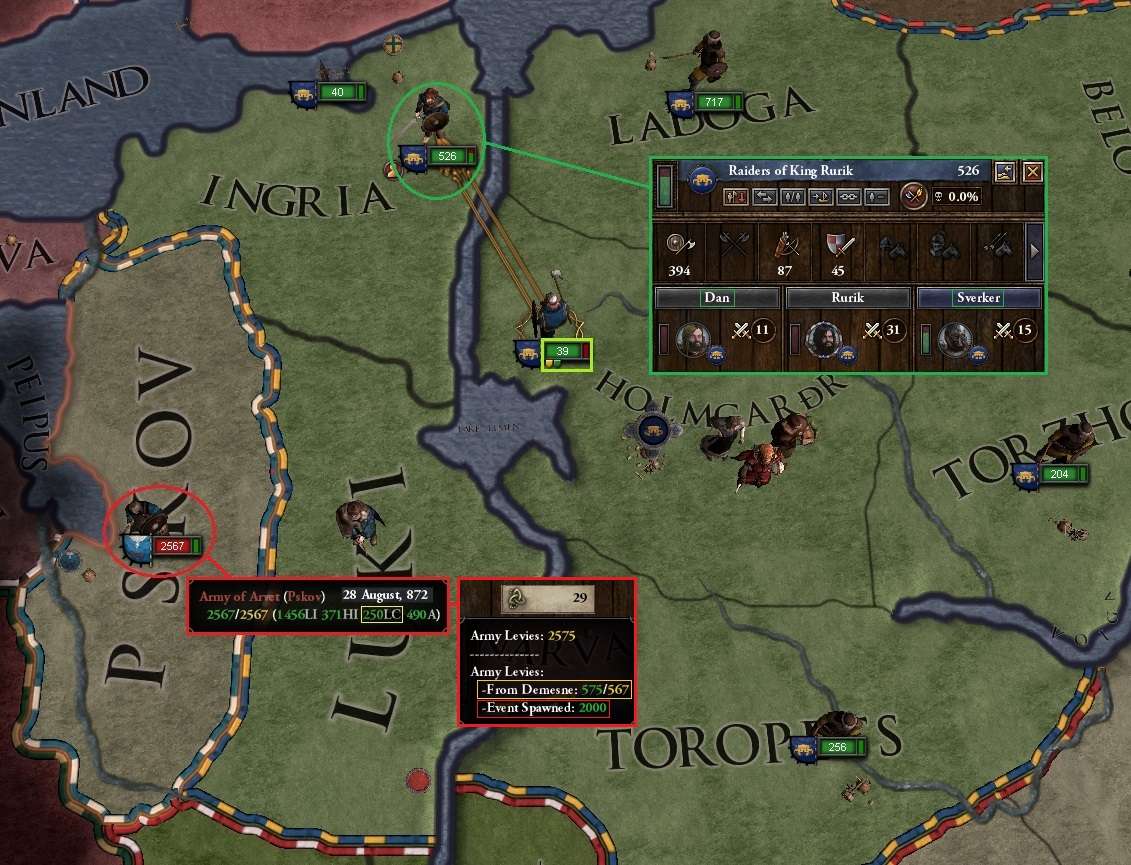
“He has immediately summoned his personal levy, which was at the ready and fully armed straight away. But he has appealed to the followers of his heathen Slavic gods, of which he is a zealous and pious follower. A great host has gathered and is already fully assembled in his stronghold. They call themselves ‘Devout Warriors’ and contain a large contingent of heavy infantry and a force of 250 light cavalry.”
“Cavalry!” exclaims Rurik. “If only I had such under my command. This changes everything. Rest briefly, my good man. I am back to Nöteborg with all haste.”
“Cavalry!” exclaims Rurik. “If only I had such under my command. This changes everything. Rest briefly, my good man. I am back to Nöteborg with all haste.”
Rurik issues orders for the now very rash-seeming march to Pskov by his small contingent of raiders to be halted immediately. Orders are issues to await the main body of his levies there, and the Godi’s small contingent is also summoned. He also calls Dan and Sverker to his side, ready to man the two wings once the army is assembled.
The two other demesne levies in Toropets and Torzhok continue to gather in place for now. Rurik will rely on his own (stellar) military skills and those of his two wing commanders to make up for the slight numerical imbalance he now contemplates against this unexpectedly strong enemy he confronts. This isn’t what he was expecting when he set out so boldly – indeed arrogantly – barely more than a week ago! On to Plan B.

Ch 14 Learning Point 1: Devout Warriors. Well, as I was playing on from here and wanted to quickly find out what the hell had happened here, I did a quick search and found this info in a dev diary and a thread comment: “First of all, Defensive Pagans now have the ability to summon bands of Devout Warriors if they are the primary defender against an enemy of a different religion at the cost of 200 piety. Overall this is rather like the Raise Tribal Army decision and gives Defensive Pagans some extra punch when attacked.” Looks like it’s 2,000 troops per 200 Piety, in a defensive war. And you can see Dobrozhir, who started with 227 Piety, now has 26, plus 2,000 event spawned troops. I’m glad he didn’t have 400+ piety!!
“Elementary, by Dear Bullfilter!” one might say - once you know about it, anyway! So, point pretty clearly learned, others beware if you hadn’t encountered this before. Any other thoughts or comments welcome, but otherwise it’s just another one down to experience – and that Rurik will have to deal with. Damn!
“Elementary, by Dear Bullfilter!” one might say - once you know about it, anyway! So, point pretty clearly learned, others beware if you hadn’t encountered this before. Any other thoughts or comments welcome, but otherwise it’s just another one down to experience – and that Rurik will have to deal with. Damn!
September 872
More pleasant news comes Rurik’s way.

Iliana will be sent back to the court Nygarðr for her upbringing, while the Queen stays in Constantinople.
Less pleasant news is received the same day. Dobrozhir and his ‘Army of Arvet’ is now on the march to Ingria! It is estimated he will arrive on 27 September; the levies from Holmgarðr and Ladoga should arrive before then. A stand will be made in Ingria: just in case, the incompletely raised levies from Toropets and Torzhok are now summoned. They may not arrive in time for the battle, but may be needed as reinforcements later.

By 23 September, both the main levy groups had arrived. Vsemil came with them, automatically answering the call as one of Rurik’s designated commanders. Maybe he’s not so bad after all – certainly better than his relative Svetozar. He replaces Dan on the left wing, given his slightly higher martial prowess. The fleet is sent out to sea – just in case: if things go badly, perhaps it could be captured by those bothersome Pskovans if it remains at anchor in Ingria.
Ch 14 Q1: Fleets at Port. Is that right? If a fleet is in port when a province is taken, is it captured or destroyed? Or does it automatically escape to sea?

Ch 14 Q2: Looter Toggle (again). Another minor learning point: when I couldn’t get the forces to merge at first, I discovered the looting toggle was still on with Rurik’s Raiders, and it was apparently preventing the merger. I switched it off and that allowed them to merge as usual. That raiding toggle is no end of arcane trouble for a CK2 neophyte! So, I also assume had I proceeded to move that force into Pskov, it would have been treated as a raiding instead of an invading force – until such time as I discovered and changed it?
The Battle of Ingria Tribe starts on 28 September [NB: for battles, I will just take the time span the game attributes to these, rather than the more literary – and realistic – AAR convention of describing it as occurring in a single day.] Apart from an overall lack of numbers compared to the attackers, in retrospect the enemy’s advantages in archers, heavy infantry and cavalry are telling, even though they only have the two flanks manned and have far less effective commanders.

As Rurik takes his rest after the second day of the battle, he is approached by a comely young Norse lass. He reminds him somewhat of his absent Queen. Edla is apparently visiting Nöteborg (her place of birth) and has made a bit of an impression on Rurik. He briefly notices she is married, but doesn’t pay any attention to whom. He has been away for a few years and can’t recall the names and backgrounds of all the courtiers. Anyway, there is a battle to be won! They exchange a few polite pleasantries and go on their respective ways. [You will have to wait until a little later to see which path Rurik chose.]

October 872
As the battle progresses, Rurik looks a little anxiously at the reports that estimate when those other levies – all now in Holmgarðr but at different stages of the march - will be in place. Not for a while yet.

By 4 October, the fighting is taking its toll on both sides. Dobrozhir of Pskov breaks first in the centre – good news. But Sverker breaks soon after on Rurik’s left, not only negating but outweighing their gain in the centre. Rurik will again be outnumbered, and it is against the main Devout Warrior host – with its superiority in heavy infantry and its light cavalry squadron.

Two days later, Rurik is wound tense as he senses the battle turning against him, despite all his efforts – he is concerned the reinforcements on their way will be too late, too little or both. He adjourns to his room in the nearby Nöteborg keep of Nuyanza. He falls into a disturbed sleep …
… and wakes up soon after. As he paces the corridor in the dark of the night, he notices a door slightly ajar. Dim candlelight seeps out. Then a comely head peers around the door – the occupant has heard his footsteps. It is Edla!
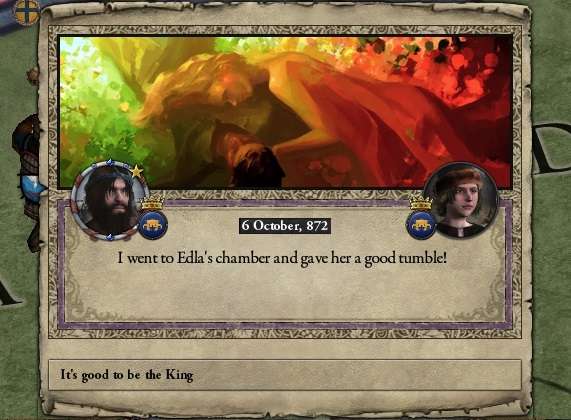
“My king! You look sorely beset by the problems of the day. Is there anything I may do to ease your tensions?” The words themselves were innocent enough. Not so the intent behind them, which was very clear to Rurik.
“As a matter of fact, my dear, I think there is …”
“As a matter of fact, my dear, I think there is …”

… after a time – or a few times [an oldie but a goodie] – Rurik asks Edla a question, as he lays back on her bed, tension well and truly relieved.
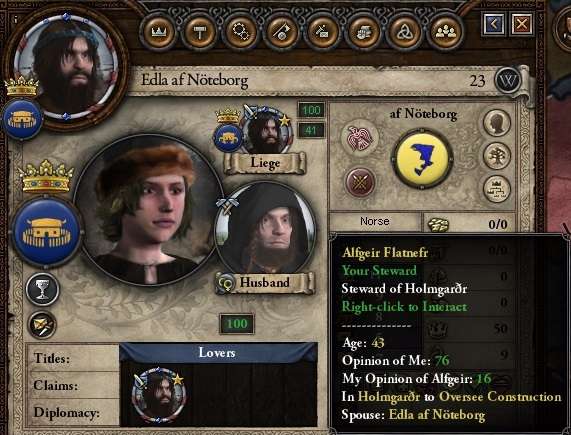
“I didn’t ask before and did not think to now, but I seem to recall you are married, are you not? As I am.”
“Yes, My Very Great King,” she answers, looking down briefly before returning her eyes to those of her king – and now lover. “Indeed, you arranged the marriage some six-odd years ago now. I am married to Alfgeir Flatnefr, your Royal Steward!”
“Ah yes, I remember now. Well, he continues to provide loyal service, through you, my dear.” There could be complications later, Rurik thinks to himself, but does not concern himself too greatly about them. It is, after all, good to be the Konungr!
“Yes, My Very Great King,” she answers, looking down briefly before returning her eyes to those of her king – and now lover. “Indeed, you arranged the marriage some six-odd years ago now. I am married to Alfgeir Flatnefr, your Royal Steward!”
“Ah yes, I remember now. Well, he continues to provide loyal service, through you, my dear.” There could be complications later, Rurik thinks to himself, but does not concern himself too greatly about them. It is, after all, good to be the Konungr!

As feared, with the reduced forces on the battlefield, the attacker’s advantages in numbers, heavy infantry, cavalry and archers are continuing to tell. By 12 October, the resumption of archery skirmishing seems to be favouring the enemy and the morale of Rurik’s key central regiment is beginning to falter. Even if they last long enough for the reinforcements to arrive, they look unlikely to be enough to turn the tide. But the fight continues, with Rurik hoping for something to turn the tide.

Sure enough, while some of the reinforcements arrived before the battle was finally decided, they were not enough. All they ended up doing was to provide a leaderless rear-guard to be butchered after the centre and right wing fled the field. By 24 October, the cause was hopeless. Damn, thought Rurik, I should have sent word for them to turn back once the tide had turned two weeks ago. I have sacrificed my men needlessly!

And by 29 October, the Battle of Ingria Tribe ends in ignominious defeat! Curses to those infidel warriors – they may be heathens, but they are certainly effective! If not for them, Dobrozhir’s head would have been on a plate by now. The army has suffered heavy but not terminal losses. It flees in uncontrolled rout all the way to Smaleskja! Dobrozhir now has the advantage in the war and puts the tribal holding in Ingria to siege!

As the army retreated from Ingria, Rurik had already diverted to his capital holding of Nygarðr. He arrived there the day the last Holmgarðian troops were being swept from the field in Ingria. It is time now for Plan C!
“Helgi, you are to leave off this fruitless assembly of a raiding host – nothing has come of it for all this time. I need you, by my side, at once. You will see battle for the first time, as my right hand. See to it we quickly recruit one of those mercenary bands that have been lurking around in search of work. Nothing too expensive, but I want a band with plenty of heavy infantry, cavalry and archers. These were among our chief deficiencies in Ingria. I want to throw in the remaining levies that were holding here in with them and head back immediately to relieve Ingria and catch these bastards before they have recovered or have succeeded in reducing Nuyanza’s holding there.”
“Yes Father, as you command. Of those available, perhaps the Bulgarian Company will do the trick? Not cheap, but not exorbitant and Steward Alfgeir reports we can afford the monthly cost for some time yet.”
“Er, yes, Alfgeir. Good man – been quite a while since I’ve seen him. Well, get on with it then. I want back at ‘em quickly.” He hurries off – without Helgi having noticed his slight discomfort at the mention of the loyal Steward’s name.
“At once Father.” Helgi’s moment of truth approaches.
“Yes Father, as you command. Of those available, perhaps the Bulgarian Company will do the trick? Not cheap, but not exorbitant and Steward Alfgeir reports we can afford the monthly cost for some time yet.”
“Er, yes, Alfgeir. Good man – been quite a while since I’ve seen him. Well, get on with it then. I want back at ‘em quickly.” He hurries off – without Helgi having noticed his slight discomfort at the mention of the loyal Steward’s name.
“At once Father.” Helgi’s moment of truth approaches.

November 872
Three days later, they are on the road to Ingria.

Ch 14 Q3: Morale. OK, it was only later that I noticed a few things I didn’t at the time. The first is this issue of morale. Before they set out (after they were called up) this new army seemed to have a full green bar of morale (on the main map icon, anyway). Yet now, as I look back on the screenshot, I see the morale of Helgi’s and Sverker’s wings are suddenly near zero, and of Rurik’s only about 50%. I wonder what has caused this? Is it specific to the commander and residual from the battle just fought – and lost? But then, given Helgi has only just been assigned, that should not apply to him. If it is to the troops, why is it suddenly so low? Is there some ramping-up period for the mercs to come to full morale that I didn’t notice at the time? Or something about changing commanders on them (which again I hadn’t noticed before)? Any knowledge or pointers on this aspect, or what the causes of this lowered morale might have been, very welcome.
In the meantime, Dobrozhir and his damned Devout Warriors are reducing Ingria's fort. Its garrison is only small – Rurik hopes he can relieve them before it is taken and the attacker’s morale has fully recovered.

Back in the capital, the stone hillfort is completed. Rurik hopes it won’t be needed for an actual defence of his home county!

December 872
On 12 December, Rurik’s new – mainly mercenary – force arrives in Ingria. The Second Battle of Ingria Tribe is joined - just in time to relieve the fort’s defenders! This time he has the advantage in overall numbers, but especially in archers, heavy infantry and cavalry – as well as leadership. Dobrozhir, in the centre again, collapses quickly – the morale of his troops clearly started well below that of his devout allies.

Sverker is finding it hard on the right against those worthies and is bearing the brunt of the casualties. The morale of that wing, not fully recovered on the approach to Ingria, is already suffering. But Rurik is able to concentrate his archers on the enemy, while Helgi takes his unchallenged regiment on the left wing across. Though it is not clear whether this will end in pursuit of the retreating enemy centre (which he is currently doing), or him joining the fray against the enemy’s left. But things are looking much better in this battle than in the last – forward to victory!
Back in the realm, more military infrastructure is completed.

By 15 December, after three days of combat, Sverker has once again fled the field, with the Pskovan Devout Warrior band turning on Rurik’s centre – where he is now badly outnumbered. It looks [from my uneducated reading of the screenshot] that Helgi is still pursuing the retreating enemy centre rather than closing with the enemy’s left [Is this right?]. But morale in Rurik’s and Helgi’s wings still seem to be better than the enemy’s, though total numbers are now about even again.

Five days later, and Rurik’s centre has collapsed, suffering some nasty casualties as they flee. Helgi has has seen off the enemy centre and now joins combat with the enemy – though it looks too late: even if the morale of his troops is higher, he is outnumbered more than two-to-one. Still, he presses the attack and is causing the enemy some grief, at least.

Even as Rurik tries to rally his fleeing troops and knows not how his son now fares, fighting to the end alone in Ingria, the tough lessons of this war against Pskov have improved Rurik’s military prowess – with experience won the hard way.

Rurik devotes this newfound acumen to the mastery of fighting in rough terrain. This will suit the many forests in this part of the world. A mastery of flanking attacks may be useful, but his place is in the centre – and despite this recent chastening experience, he does not intend to be sitting on the defensive more than the absolute minimum. So rough terrain it is!
Word comes through on 31 December – the year ends in another defeat.

This time, what had seemed so promising at the start turned again to ignominy. Twice the enemy’s leader has fled early, but twice his band of Devout Warriors have saved his bacon! Double damnation! Dobrozhir’s position in the conflict improves again, on the back of his holy fanatics. But his strength and morale have again been damaged, even while he continues his siege of Nuyanza’s holding in Ingria.
But again, while casualties have been heavy for Holmgarðr, the battle was not quite so one-sided this time. That said, Rurik searches for some reasons for this second loss: he wonders why the morale of his troops was not as high at the start of this march as they should have been. And why, with the early loss of the enemy centre, couldn’t they take that initiative to win the day? Should he have positioned the relative strengths of his three battles differently this time? Or was it something about the standard and experience of the mercenaries he had hired that counted against them – something he should have looked to more closely before the battle?
Also, he now realises that, in his haste to close with the enemy again, this time he did so from a less tactically advantageous position – across a river. Might that have cost the difference between victory and defeat this time round? Despite better martial abilities and, in this second battle, a superiority in the kind of troops the enemy had the advantage of last time, they had still lost.
His immediate conclusions, as dictated at the time to Gumarich der Schreiber, and pending a more thorough analysis of the campaign which would come later, were the following:
- Don’t attack across a river next time – especially with only roughly even numbers. Look for combat on more favourable ground.
- It is time now to concentrate the remaining forces together to try to gather overwhelming numbers, especially against such a difficult enemy as the Pskovan ‘Devout Warriors’ have shown themselves to be.
- If necessary, we will just have to let the holdings in Ingria be taken – they can be rebuilt later. Bad for Nuyanza perhaps, but they’re not royal demesne holdings.
- Don’t be over-confident and rush in half-cocked.

Rule 1. Han Solo may not be one of the traditional Norse Gods - but he should have been!
Ch 14 Q4: Field Battles. Bearing in mind the rest of this campaign has been fought out but still seeking to learn as much from this opening six months few months as possible, I’ll pose a few other questions (to add to those mentioned above in the commentary and in Rurik’s reflections. Are there other factors here I’ve ignored or should have looked at more closely? Should I next time record some of the ‘mouse-over’ battle stats that come up for any pointers about what has gone on – or is that really just pre-ordained and there for flavour? Any pertinent tips or tactics welcome.
ᚔ ᚱᚢᚱᛁ ᚲᛁᛞ ᚔ
So, as an eventful year closes, Rurik invites all his military advisers to continue to offer their views of the war of conquest on Pskov and the prosecution of its first period. This request remains open whether those views are provided now or after its conclusion. The lessons will be equally relevant then. In the meantime, Rurik and his commanders remain determined to retrieve the situation, even while the enemy despoils Ingria. They will now concentrate both the defeated armies in the capital province of Holmgarðr and consider their next steps. One of which is a call for his vassals to join as allies.
Questions
Ch 14 Learning Point 1: Devout Warriors. Well, as I was playing on from here and wanted to quickly find out what the hell had happened here, I did a quick search and found this info in a dev diary and a thread comment: “First of all, Defensive Pagans now have the ability to summon bands of Devout Warriors if they are the primary defender against an enemy of a different religion at the cost of 200 piety. Overall this is rather like the Raise Tribal Army decision and gives Defensive Pagans some extra punch when attacked.” Looks like it’s 2,000 troops per 200 Piety, in a defensive war. And you can see Dobrozhir, who started with 227 Piety, now has 26, plus 2,000 event spawned troops. I’m glad he didn’t have 400+ piety!!
Ch 14 Q1: Fleets at Port. Is that right? If a fleet is in port when a province is taken, is it captured or destroyed? Or does it automatically escape to sea?
Ch 14 Q2: Looter Toggle (again). Another minor learning point: when I couldn’t get the forces to merge at first, I discovered the looting toggle was still on with Rurik’s Raiders, and it was apparently preventing the merger. I switched it off and that allowed them to merge as usual. That raiding toggle is no end of arcane trouble for a CK2 neophyte! So, I also assume had I proceeded to move that force into Pskov, it would have been treated as a raiding instead of an invading force – until such time as I discovered and changed it?
Ch 14 Q3: Morale. OK, it was only later that I noticed a few things I didn’t at the time. The first is this issue of morale. Before they set out (after they were called up) this new army seemed to have a full green bar of morale (on the main map icon, anyway). Yet now, as I look back on the screenshot, I see the morale of Helgi’s and Sverker’s wings are suddenly near zero, and of Rurik’s only about 50%. I wonder what has caused this? Is it specific to the commander and residual from the battle just fought – and lost? But then, given Helgi has only just been assigned, that should not apply to him. If it is to the troops, why is it suddenly so low? Is there some ramping-up period for the mercs to come to full morale that I didn’t notice at the time? Or something about changing commanders on them (which again I hadn’t noticed before)? Any knowledge or pointers on this aspect, or what the causes of this lowered morale might have been, very welcome.
Ch 14 Q4: Field Battles. Bearing in mind the rest of this campaign has been fought out but still seeking to learn as much from this opening six months few months as possible, I’ll pose a few other questions (to add to those mentioned above in the commentary and in Rurik’s reflections. Are there other factors here I’ve ignored or should have looked at more closely? Should I next time record some of the ‘mouse-over’ battle stats that come up for any pointers about what has gone on – or is that really just pre-ordained and there for flavour? Any pertinent tips or tactics welcome.
ᚔ ᚱᚢᚱᛁ ᚲᛁᛞ ᚔ

Mímir (Old Norse "The rememberer, the wise one") or Mim is a figure in Norse mythology renowned for his knowledge and wisdom who is beheaded during the Æsir-Vanir War. Afterward, the god Odin carries around Mímir's head and it recites secret knowledge and counsel to him.
Rurik decides to remind himself constantly of Mímir’s fate – despite his legendary wisdom, he still lost his head. He would rather not lose his, even if he continues to revere and serve the All-Father, as Mímir did. He is and wishes to remain rather attached to his body. Especially with young Edla around! That said, some secret knowledge and counsel whispered to him right now would be most welcome – as it always is.
Last edited:
Threadmarks
View all 262 threadmarks
Reader mode
Reader mode

